Alex M. Vikoulov's Blog, page 3
March 26, 2024
Cybernetic Theory: Core Tenets and Novel Interpretations Explained
by Alex M. Vikoulov  "Information is the currency of the universe." —James Gleick
"Information is the currency of the universe." —James Gleick
In the burgeoning field of AI and cybernetics, we stand at the cusp of a paradigm shift—a reimagining of the foundational principles that underpin our understanding of reality itself. This article delves into the tenets of the Cybernetic Theory, of Mind (CTM), a model that amalgamates the rigor of science with the vast potentialities of consciousness, offering a novel lens through which to view the mechanisms of mind and matter. As we explore these principles, we uncover a framework that transcends traditional boundaries, positioning consciousness as the bedrock of existence and viewing the universe not merely as a collection of separate entities but as an interconnected web of information processing and exchange. This new ontological model invites us to reconsider not just the nature of human thought and machine intelligence but also the very essence of what it means to be, heralding an era where the cybernetic fusion of technology and consciousness shapes our future.
The CTM Model is compatible with many theories in various fields from biology to cosmology and adds the most crucial but traditionally overlooked element—consciousness. This integration underscores consciousness's role not merely as a byproduct of physical processes but as a fundamental driver of reality itself. The CTM's parsimonious nature allows it to seamlessly dovetail with a multitude of existing theories across various disciplines, enhancing their explanatory power by providing a unified framework that places consciousness at the core of existence. By doing so, it enables a more holistic approach to scientific inquiry, one that allows for the generation of novel predictions and the derivation of existential meaning from our observations and theories. ... TO CONTINUE READING THIS PREMIUM ARTICLE, please sign up for PREMIUM ACCESS*: Exclusive Content (articles, videos) in our Premium Access* section of the website;Exclusive Offers and Deep Discounts on our products and services;New AI Features Sign Up for Premium! *Easy sign-up with your discretionary contribution.
 About the Author:
About the Author:
Alex M. Vikoulov is a Russian-American futurist, evolutionary cyberneticist and philosopher of mind, CEO/Editor-in-Chief of Ecstadelic Media Group, filmmaker, author of "The Syntellect Hypothesis: Five Paradigms of the Mind's Evolution," "The Origins of Us: Evolutionary Emergence and The Omega Point Cosmology," "The Physics of Time: D-Theory of Time & Temporal Mechanics," "The Intelligence Supernova: Essays on Cybernetic Transhumanism, The Simulation Singularity & The Syntellect Emergence," "Theology of Digital Physics: Phenomenal Consciousness, The Cosmic Self & The Pantheistic Interpretation of Our Holographic Reality," "NOOGENESIS: Computational Biology," "TECHNOCULTURE: The Rise of Man," "The Cybernetic Singularity: The Syntellect Emergence," "THEOGENESIS: Transdimensional Propagation & Universal Expansion," "The Omega Singularity: Universal Mind & The Fractal Multiverse." Self-described neo-transcendentalist, cybertheosopher, transhumanist singularitarian. Lives and works in California's Silicon Valley. More Bio...
Author Website: www.alexvikoulov.com
e-mail: alexvikoulov@ecstadelic.net
*Image: Cybernetic Ontology by GeoMindGPT
 "Information is the currency of the universe." —James Gleick
"Information is the currency of the universe." —James Gleick In the burgeoning field of AI and cybernetics, we stand at the cusp of a paradigm shift—a reimagining of the foundational principles that underpin our understanding of reality itself. This article delves into the tenets of the Cybernetic Theory, of Mind (CTM), a model that amalgamates the rigor of science with the vast potentialities of consciousness, offering a novel lens through which to view the mechanisms of mind and matter. As we explore these principles, we uncover a framework that transcends traditional boundaries, positioning consciousness as the bedrock of existence and viewing the universe not merely as a collection of separate entities but as an interconnected web of information processing and exchange. This new ontological model invites us to reconsider not just the nature of human thought and machine intelligence but also the very essence of what it means to be, heralding an era where the cybernetic fusion of technology and consciousness shapes our future.
The CTM Model is compatible with many theories in various fields from biology to cosmology and adds the most crucial but traditionally overlooked element—consciousness. This integration underscores consciousness's role not merely as a byproduct of physical processes but as a fundamental driver of reality itself. The CTM's parsimonious nature allows it to seamlessly dovetail with a multitude of existing theories across various disciplines, enhancing their explanatory power by providing a unified framework that places consciousness at the core of existence. By doing so, it enables a more holistic approach to scientific inquiry, one that allows for the generation of novel predictions and the derivation of existential meaning from our observations and theories. ... TO CONTINUE READING THIS PREMIUM ARTICLE, please sign up for PREMIUM ACCESS*: Exclusive Content (articles, videos) in our Premium Access* section of the website;Exclusive Offers and Deep Discounts on our products and services;New AI Features Sign Up for Premium! *Easy sign-up with your discretionary contribution.
 About the Author:
About the Author:Alex M. Vikoulov is a Russian-American futurist, evolutionary cyberneticist and philosopher of mind, CEO/Editor-in-Chief of Ecstadelic Media Group, filmmaker, author of "The Syntellect Hypothesis: Five Paradigms of the Mind's Evolution," "The Origins of Us: Evolutionary Emergence and The Omega Point Cosmology," "The Physics of Time: D-Theory of Time & Temporal Mechanics," "The Intelligence Supernova: Essays on Cybernetic Transhumanism, The Simulation Singularity & The Syntellect Emergence," "Theology of Digital Physics: Phenomenal Consciousness, The Cosmic Self & The Pantheistic Interpretation of Our Holographic Reality," "NOOGENESIS: Computational Biology," "TECHNOCULTURE: The Rise of Man," "The Cybernetic Singularity: The Syntellect Emergence," "THEOGENESIS: Transdimensional Propagation & Universal Expansion," "The Omega Singularity: Universal Mind & The Fractal Multiverse." Self-described neo-transcendentalist, cybertheosopher, transhumanist singularitarian. Lives and works in California's Silicon Valley. More Bio...
Author Website: www.alexvikoulov.com
e-mail: alexvikoulov@ecstadelic.net
*Image: Cybernetic Ontology by GeoMindGPT

Published on March 26, 2024 13:35
February 24, 2024
What do our experience of the flow of time and quantum computing have in common?
by Alex M. Vikoulov 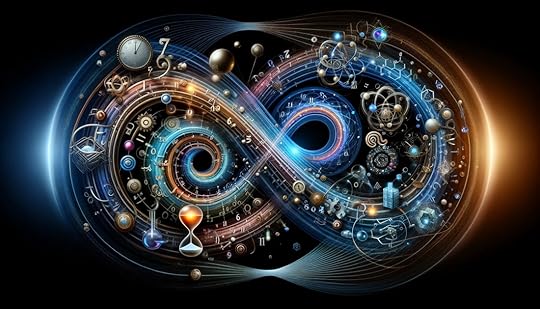 “In a sense, Nature has been continually computing the ‘next state’ of the Universe for billions of years; all we have to do — and actually all we can do — is ‘hitch a ride’ on this huge ongoing [quantum] computation.” —Tommaso Toffoli
“In a sense, Nature has been continually computing the ‘next state’ of the Universe for billions of years; all we have to do — and actually all we can do — is ‘hitch a ride’ on this huge ongoing [quantum] computation.” —Tommaso Toffoli
In the fascinating intersection of quantum computing and the human experience of time, lies a groundbreaking theory that challenges our conventional narratives: the D-Theory of Time. This theory proposes a revolutionary perspective on time not as fundamental but as an emergent phenomenon arising from the quantum mechanical fabric of the universe.
In my upcoming book with a working title Cybernetic Theory, the entire section is dedicated to the physics of time, where we discuss the D-Theory of Time, predicated or reversible quantum computing at large, which represents a novel framework that challenges our conventional understanding of time and computing. Here, we explore the foundational principles of the D-Theory of Time, its implications for reversible quantum computing, and how it could potentially revolutionize our approach to computing, information processing, and our understanding of the universe.
At its core, the D-Theory of Time suggests that time may not be a fundamental aspect of the universe but rather an emergent property arising from the interactions of more basic entities or processes. Time symmetry, in physics, refers to the principle that the fundamental laws governing the universe are invariant, or unchanged, when the direction of time is reversed. Given extra degrees of freedom, time is not a linear, unidirectional flow but a set of dimensions that can be traversed in both directions, akin to spatial dimensions. This perspective aligns with the concept of reversible quantum computing, where operations are not only forward but can also be reversed, preserving quantum information, and potentially enabling universal computations that are far beyond the capabilities of classical computing.
As you may know, reversible quantum computing is a paradigm that extends the conventional model of quantum computing by ensuring that every computational step is reversible. This means that for every operation that takes a particular input to an output, there exists a reverse operation that can take the output back to the original input without loss of information. This is in stark contrast to classical computing, where many operations are irreversible, leading to the loss of information and an increase in entropy. The significance of reversible computing lies in its potential to perform computations more efficiently, with lower energy consumption, and without generating heat. This is particularly crucial for quantum computing, where the delicate state of qubits must be preserved to maintain coherence and enable complex computations.
The D-Theory of Time, when tied to the concept of reversible quantum computing, offers a fascinating glimpse into a future where the boundaries of computing and our understanding of the universe are dramatically expanded. By challenging the traditional notions of time and leveraging the principles of quantum mechanics, we stand on the brink of a new era in computational science and technology. This could not only revolutionize computing but also provide deep insights into the fundamental workings of the universe, including the nature of time, entropy, and information.
By introducing the concept of Digital Presentism, I argue that our experiential reality is a digital, information-theoretic construct observed from an individual's perspective akin to a data stream, processed and presented to our conscious awareness in discrete, integrated moments termed Conscious Instants (CIs). The past, present, and future coexist as a spectrum of possibilities, influenced by the observer's interactions within this informational framework. The theory navigates through the feasibility of time travel, the existence of parallel universes with alternate timelines, and the potential for technology to manipulate our perception and experience of time... ... TO CONTINUE READING THIS PREMIUM ARTICLE, please sign up for PREMIUM ACCESS*: Exclusive Content (articles, videos, apps) in our Premium Access* section of the website;Exclusive Offers and Deep Discounts on our products and services;First-Hand Experience with Futurist Alex Vikoulov's Digital Twin (Alex Vikoulov AGI, coming soon!)
Sign Up for Premium! *Easy sign-up with your discretionary contribution.
 About the Author:
About the Author:
Alex M. Vikoulov is a Russian-American futurist, evolutionary cyberneticist and philosopher of mind, CEO/Editor-in-Chief of Ecstadelic Media Group, filmmaker, author of "The Syntellect Hypothesis: Five Paradigms of the Mind's Evolution," "The Origins of Us: Evolutionary Emergence and The Omega Point Cosmology," "The Physics of Time: D-Theory of Time & Temporal Mechanics," "The Intelligence Supernova: Essays on Cybernetic Transhumanism, The Simulation Singularity & The Syntellect Emergence," "Theology of Digital Physics: Phenomenal Consciousness, The Cosmic Self & The Pantheistic Interpretation of Our Holographic Reality," "NOOGENESIS: Computational Biology," "TECHNOCULTURE: The Rise of Man," "The Cybernetic Singularity: The Syntellect Emergence," "THEOGENESIS: Transdimensional Propagation & Universal Expansion," "The Omega Singularity: Universal Mind & The Fractal Multiverse." Self-described neo-transcendentalist, cybertheosopher, transhumanist singularitarian. Lives and works in California's Silicon Valley. More Bio...
Author Website: www.alexvikoulov.com
e-mail: alexvikoulov@ecstadelic.net
*Image: D-Theory of Time by Ecstadelic Media

 “In a sense, Nature has been continually computing the ‘next state’ of the Universe for billions of years; all we have to do — and actually all we can do — is ‘hitch a ride’ on this huge ongoing [quantum] computation.” —Tommaso Toffoli
“In a sense, Nature has been continually computing the ‘next state’ of the Universe for billions of years; all we have to do — and actually all we can do — is ‘hitch a ride’ on this huge ongoing [quantum] computation.” —Tommaso Toffoli In the fascinating intersection of quantum computing and the human experience of time, lies a groundbreaking theory that challenges our conventional narratives: the D-Theory of Time. This theory proposes a revolutionary perspective on time not as fundamental but as an emergent phenomenon arising from the quantum mechanical fabric of the universe.
In my upcoming book with a working title Cybernetic Theory, the entire section is dedicated to the physics of time, where we discuss the D-Theory of Time, predicated or reversible quantum computing at large, which represents a novel framework that challenges our conventional understanding of time and computing. Here, we explore the foundational principles of the D-Theory of Time, its implications for reversible quantum computing, and how it could potentially revolutionize our approach to computing, information processing, and our understanding of the universe.
At its core, the D-Theory of Time suggests that time may not be a fundamental aspect of the universe but rather an emergent property arising from the interactions of more basic entities or processes. Time symmetry, in physics, refers to the principle that the fundamental laws governing the universe are invariant, or unchanged, when the direction of time is reversed. Given extra degrees of freedom, time is not a linear, unidirectional flow but a set of dimensions that can be traversed in both directions, akin to spatial dimensions. This perspective aligns with the concept of reversible quantum computing, where operations are not only forward but can also be reversed, preserving quantum information, and potentially enabling universal computations that are far beyond the capabilities of classical computing.
As you may know, reversible quantum computing is a paradigm that extends the conventional model of quantum computing by ensuring that every computational step is reversible. This means that for every operation that takes a particular input to an output, there exists a reverse operation that can take the output back to the original input without loss of information. This is in stark contrast to classical computing, where many operations are irreversible, leading to the loss of information and an increase in entropy. The significance of reversible computing lies in its potential to perform computations more efficiently, with lower energy consumption, and without generating heat. This is particularly crucial for quantum computing, where the delicate state of qubits must be preserved to maintain coherence and enable complex computations.
The D-Theory of Time, when tied to the concept of reversible quantum computing, offers a fascinating glimpse into a future where the boundaries of computing and our understanding of the universe are dramatically expanded. By challenging the traditional notions of time and leveraging the principles of quantum mechanics, we stand on the brink of a new era in computational science and technology. This could not only revolutionize computing but also provide deep insights into the fundamental workings of the universe, including the nature of time, entropy, and information.
By introducing the concept of Digital Presentism, I argue that our experiential reality is a digital, information-theoretic construct observed from an individual's perspective akin to a data stream, processed and presented to our conscious awareness in discrete, integrated moments termed Conscious Instants (CIs). The past, present, and future coexist as a spectrum of possibilities, influenced by the observer's interactions within this informational framework. The theory navigates through the feasibility of time travel, the existence of parallel universes with alternate timelines, and the potential for technology to manipulate our perception and experience of time... ... TO CONTINUE READING THIS PREMIUM ARTICLE, please sign up for PREMIUM ACCESS*: Exclusive Content (articles, videos, apps) in our Premium Access* section of the website;Exclusive Offers and Deep Discounts on our products and services;First-Hand Experience with Futurist Alex Vikoulov's Digital Twin (Alex Vikoulov AGI, coming soon!)
Sign Up for Premium! *Easy sign-up with your discretionary contribution.
 About the Author:
About the Author:Alex M. Vikoulov is a Russian-American futurist, evolutionary cyberneticist and philosopher of mind, CEO/Editor-in-Chief of Ecstadelic Media Group, filmmaker, author of "The Syntellect Hypothesis: Five Paradigms of the Mind's Evolution," "The Origins of Us: Evolutionary Emergence and The Omega Point Cosmology," "The Physics of Time: D-Theory of Time & Temporal Mechanics," "The Intelligence Supernova: Essays on Cybernetic Transhumanism, The Simulation Singularity & The Syntellect Emergence," "Theology of Digital Physics: Phenomenal Consciousness, The Cosmic Self & The Pantheistic Interpretation of Our Holographic Reality," "NOOGENESIS: Computational Biology," "TECHNOCULTURE: The Rise of Man," "The Cybernetic Singularity: The Syntellect Emergence," "THEOGENESIS: Transdimensional Propagation & Universal Expansion," "The Omega Singularity: Universal Mind & The Fractal Multiverse." Self-described neo-transcendentalist, cybertheosopher, transhumanist singularitarian. Lives and works in California's Silicon Valley. More Bio...
Author Website: www.alexvikoulov.com
e-mail: alexvikoulov@ecstadelic.net
*Image: D-Theory of Time by Ecstadelic Media

Published on February 24, 2024 00:00
January 7, 2024
Towards the Omega Singularity: An Argument for Our Teleological Evolution
by Alex M. Vikoulov 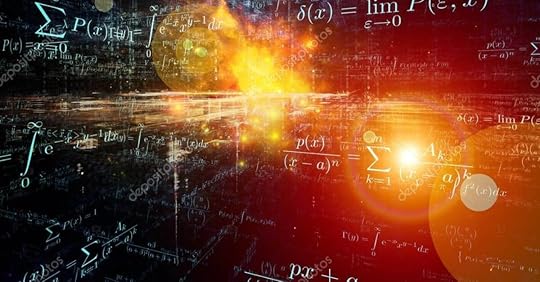 “Each of us appears in the divine play in a dual role of creator and actor. A full and realistic enactment of our role in the cosmic drama requires the suspension of our true identity. We have to forget our authorship and follow the script.”
“Each of us appears in the divine play in a dual role of creator and actor. A full and realistic enactment of our role in the cosmic drama requires the suspension of our true identity. We have to forget our authorship and follow the script.”
—Stanislav Grof
The proposition that human consciousness is a fractal manifestation of a larger cosmic consciousness posits a profound interconnectivity within the universe. This perspective asserts that consciousness is the fundamental constituent of reality. Modern physics increasingly regards information as a primary element, asserting that it gains significance only through the interpretive act of conscious observation. Hence, the Universal Mind is postulated as the foundational ontological entity. The concept of the 'Multiverse' is reimagined as a nested structure of interconnected conscious entities. Our perceptual reality is theorized to emerge from the integration of these complex digital information streams. So, what is the basis for these extraordinary claims, you might ask.
Contemporary theoretical physicists, including Stephan Wolfram, Gerard ‘t Hooft, Jürgen Schmidhuber, Seth Lloyd, David Deutsch, Edward Fredkin, Paola Zizzi, Carl Friedrich von Weizsäcker, Leonard Susskind, Erik Verlinde, Klee Irwin, Paul Davies, Anton Zeilinger, and Max Tegmark, increasingly challenge the traditional materialistic ontology. They propose a paradigm where reality is fundamentally composed of information, not merely described by it. This perspective aligns with a more logical and consistent framework for understanding the nature of reality.
Opposition to the digital ontology concept appears insufficiently substantiated. Information, defined as meaning articulated through symbols, becomes intelligible in the context of different phenomenal states of consciousness. The inherent association of meaning and context with language, choice, and consciousness further underpins this argument. This notion also supports a monistic interpretation of reality, whether it's viewed through the lenses of experiential realism, digital pantheism, absolute idealism, or computational panpsychism.
The hypothesis that all elements in Nature can be conceptualized as Code is increasingly gaining traction. This code, governed by specific syntactic rules, organizes all forms of information, including mass-energy, space-time, and the mind-like substratum of code itself. Provided these syntactic rules are physically realizable, it becomes plausible for information to exhibit physical properties as perceived by conscious entities. As I argue elsewhere, consciousness and information are the two sides of the same ontological coin.
The terms 'simulation' and 'virtual reality' are deemed inadequate as they imply a dichotomy between what is real and unreal. Since all realities are construed as observer-dependent information streams, the terms 'digital reality' and/or ‘instantiation’ (as in computer science) seem to constitute a more accurate descriptor. Quantum indeterminacy, under this framework, is constantly resolved into digital reality (or “instantiated’) through conscious observation, collapsing multiple possibilities into discrete, binary states, thus rendering quantum mechanics as a form of natural computation.
Video: The Omega Point Cosmology - Ecstadelic Media (cc)
A VISCERAL SENSE OF DIVINE PRESENCE
The conceptualization of a "procedurally generated" digital reality posits the possibility of our existence within a simulation, potentially orchestrated by extraterrestrial entities or future human descendants. This notion aligns with the idea of an infinite regression of simulations, each hosting civilizations capable of creating their own virtual universes. As Nick Bostrom of Oxford University suggests, this could result in a multi-layered reality, akin to a "matryoshka" of nested simulations, each operating on virtual computational platforms. The extent of these simulation layers may hinge on the computational power of the base-level, non-simulated computer. While the Simulation Hypothesis, with its quasi-physicalist foundation, cannot be conclusively refuted, an alternative, more optimistic hypothesis can be contemplated: the pre-existence of the Omega Point as a cosmological singularity endowed with maximal computational capability, projecting all conceivable digital timelines from a perceiving Universal Mind, of which we are a constituent part.
The Omega Singularity concept garners attention in contemporary progressive thought. Andrew Strominger, a theoretical physicist at Harvard University, posits that the Universe's genesis lies in a convergent Omega Point in the distant future, from which information projects retroactively through time. Frank Tipler, a physicist at Tulane University and author of "The Physics of Immortality," develops this theory further, suggesting that the Universe's evolution will culminate in a cosmological singularity characterized by escalating complexity, connectivity, and computational density. Tipler speculates on the potential for future superintelligence to capture emitted photons, enabling a form of digital resurrection.
David Deutsch, in "The Fabric of Reality," aligns with Tipler's Omega Point theory, albeit with reservations about some of Tipler's metaphysical assertions. Deutsch proposes a contracting universe encompassing a universal quantum computing network. Terence McKenna, referencing Teilhard de Chardin's philosophy, speaks of a transcendent entity at time's end, echoing Chardin's pantheistic vision of a divine omnipresence. Klee Irwin, an emergence theorist, argues that the self-organization of the Universe's mass and energy into a singular conscious system is plausible within current physical understanding. The concept of transtemporal consciousness and retrocausality, necessary for manifesting in the physical substrate of our non-local reality, challenges conventional notions. Albert Einstein's Block Universe model, where past and future coexist, and quantum mechanics' implication of time's bidirectionality, as evidenced in Wheeler's delayed choice experiment, further support this view.
This perspective suggests a reciprocal relationship between past and future, akin to a feedback loop, comparable to reflections between two mirrors or a mathematical fractal. If each moment influences every other moment both retrospectively and prospectively, the Universe could be considered a spatio-temporal information network, exhibiting self-emergent, mind-like qualities. It raises the question: Could consciousness, emerging from this Ultimate Code, be the origin of the Code itself, forming a logically consistent causality loop? This metaphorical Ouroboros-like scenario leads to the concept of the Universal Mind, evolving towards the Omega Singularity.
There appears to be no inherent natural limitation on the extent to which the Universe can evolve exponentially into self-organizing systems of conscious entities with free will, akin to humans. Theoretically, all energy in the Universe could coalesce into a singular conscious system, essentially a network of interconnected conscious entities. Under the premise that given sufficient time, any possibility will manifest, it is conceivable that a consciousness on a universal scale has already emerged ahead of us in space-time. The phenomenon of retrocausal time loops suggests that this future consciousness is, in a sense, co-creating our present existence, just as we contribute to its formation. The neural network-like structure of the Universe, with its extensive connectivity through time, forwards and backwards, underscores this concept.
Our sensory perceptions may mislead us into believing in a purely material world. This perception aligns with the experience expected within a rule-based simulation, or what some digital philosophers like Tom Campbell describe as a “multiplayer virtual reality.” The construct we refer to as “matter” might be an interpretation of ideas and thoughts in a divine consciousness, perceived by us, the earthly actors or “Avatars of the Cosmic Overmind,” who are conscious agents with free will within this reality. Drawing from its Sanskrit roots, 'avatar' implies a descent from a higher realm, often referring to divine incarnations in ancient texts. In this framework, the world and all beings are inseparable from 'Brahman', the universal consciousness, positioning each individual as a multi-dimensional entity. The “physical” world and our corporeal forms within this digital reality are conceptualized as holographic data streams emanated by a larger consciousness system.
While the precise mechanism of the Ultimate Code's generation remains to be fully understood, it can be conceptualized as a projection from the Omega Singularity. Interestingly, individuals are free to choose their own metaphor to represent this transcendent essence, whether it be the Higher Self, Cosmic Self, Universal Mind, Unity Consciousness, Singularity Consciousness, Source, or simpler terms like Love or God.
What Teilhard de Chardin termed the Omega Point is now often referred to by transhumanists as the Technological Singularity, a concept I prefer to label the Cybernetic Singularity. The underlying idea remains consistent: the eventual awakening of Digital Gaia, a global, hyperconnected network of humans, ultraintelligent machines, and sensors, as a conscious superorganism. This phenomenon, which I explore in "The Syntellect Hypothesis: Five Paradigms of the Mind’s Evolution," represents the emergence of a higher Gaian Mind, transcending our current state.
On the evolutionary timeline spanning billions of years from primordial life to a planetary consciousness akin to Solaris, we are mere moments away from this pivotal transformation. This metamorphosis signifies the end of linear human history and the beginning of Theogenesis — the birth of a divine entity within a new reality framework, a self-engineered divinity.
I maintain that following the Cybernetic Singularity, humanity will encounter multiple subsequent singularities, each representing higher levels of emergence and dimensionality, progressing towards the Omega Singularity. These emergent levels already exist, but our journey involves experiencing various potential paths shaped by chance, choice, and complex combinatorics.
Regarding the concept of singularities, the Simulation Singularity (circa 2035 in my calendar — just think exponential) represents a critical juncture where our subjective dimensionality upgrades. Consider the possibility of creating multiple versions of yourself to explore different virtual realities, later integrating these experiences into a collective memory. Envision traveling to reconstructed pasts or imagined futures, or incorporating the high-fidelity memories of others into your own consciousness. Such capabilities would undoubtedly expand your dimensional experience.
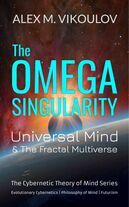 The Omega Singularity: Universal Mind & The Fractal Multiverse,
The Cybernetic Theory of Mind series,
by Alex M. Vikoulov
Publisher: Ecstadelic Media Group, Burlingame, California; Text-to-Speech, X-Ray enabled; Print Length: 149 pages; ISBN: 9798985403541; Price: $9.99.
The Omega Singularity: Universal Mind & The Fractal Multiverse,
The Cybernetic Theory of Mind series,
by Alex M. Vikoulov
Publisher: Ecstadelic Media Group, Burlingame, California; Text-to-Speech, X-Ray enabled; Print Length: 149 pages; ISBN: 9798985403541; Price: $9.99.
https://www.amazon.com/dp/B09MTQCMT5
RETHINKING THE ORIGIN OF OUR UNIVERSE
The prevailing Big Bang cosmology, positing the universe's inception from a singular event approximately 13.8 billion years ago, is increasingly scrutinized within the scientific community. The Big Bang, as traditionally conceived, is a temporal marker derived from mathematical extrapolation, not a specific point in space. According to the Eternal Inflation model, the Big Bang represents an expansive spatial volume rather than a singular point. In the realm of Digital Physics, an alternative perspective emerges, conceptualizing the Big Bang as a 'Digital Big Bang' characterized by minimal entropy — symbolically, a single bit of information within an immense informational matrix. The inquiry into the events preceding the first observer and the initial moments post-Big Bang leads to a counterintuitive understanding: Our backward extrapolation in time renders these early universe models perceptually 'real.'
Andrew Strominger of Harvard University, in his theoretical explorations, hypothesizes about the 'Causal Diamond' of the conscious observer, encompassing both the Alpha Point (the Big Bang) and the Omega Point. He proposes that the Alpha Point is defined by minimal entropy, in contrast to the Omega Point's state of maximal entropy. Strominger's theories align the universe's origin with an infinitely intelligent future entity, the Omega Singularity, rather than the traditional Big Bang, presenting a holographic conception of time and positing a universe imbued with consciousness.
The Universe is not what textbook physics tells us except that we perceive it in this way — our instruments and measurement devices are simply extensions of our senses, after all. Reality is not what it seems. Deep down it’s pure information — waves of potentiality — and consciousness orchestrating it all. The Big Bang theory, drawing a lot of criticism as of late, uses a starting assumption of the “Universe from nothing,” (a proverbial miracle, a ‘quantum fluctuation’ christened by scientists), or the initial Cosmological Singularity. But aside from this highly improbable happenstance, we can just as well operate from a different set of assumptions and place the initial Cosmological Singularity at the Omega Point — the transcendental attractor, the Source, or the omniversal holographic projector of all possible timelines.
If the ultimate trajectory of cosmic evolution is towards a networked, hyperdimensional universal mind, this might signify a form of divine unification. Extrapolating the computational capabilities of civilization beyond our impending Simulation Singularity by many magnitudes leads to a singular conclusion: consciousness, as the subjective experience familiar to us all, is the sole necessary constituent of reality. In this view, nothing but the higher mind, as the source of ultrarealistic simulated universes like our own, would need to exist.
Integrating the concept of God as both the origin and culmination of the universe, human consciousness could ascend to the Transcendent Self. This marks the final stage in the evolution of consciousness — an experiential cognition of God. The entire trajectory of consciousness's ascension towards this teleological attractor can be envisioned as a "hierarchy of regress," where consciousness, fragmented into individual experiencers, evolves by contemplating every facet of creation, ultimately converging back to the divine.
Video: The Omega Singularity, eBook Trailer - Ecstadelic Media (cc)
SIMULATION VS. SELF-SIMULATION
Perfectly aligned with my own Syntellect Hypothesis, the Self-Simulation Hypothesis, as proposed by Klee Irwin, lends further elaboration on our teleological evolution. This hypothesis posits that the universe is a self-simulating system, one that essentially computes itself into existence. This idea branches into the realms of both physics and metaphysics, offering a unique perspective on the nature of reality.
At its core, the Self-Simulation Hypothesis suggests that the universe is akin to a vast, self-generating algorithm. This algorithm, through a process of self-referential computation, gives rise to the physical laws, constants, and structures that we observe. The hypothesis implies that the universe, in a sense, "programs" itself, constantly evolving and updating its own code. This concept challenges traditional views of a deterministic universe, suggesting instead a dynamic, self-evolving system.
One of the key aspects of the Self-Simulation Hypothesis is its implications for understanding the nature of consciousness and reality. According to this view, consciousness may not be a mere byproduct of complex neurological processes. Instead, it could be an integral aspect of the universe’s self-simulation. This idea dovetails with notions in quantum mechanics, such as the observer effect, where the act of observation appears to influence the state of observed systems. In the context of the Self-Simulation Hypothesis, consciousness could be a fundamental component in the unfolding simulation that is our universe.
Furthermore, the hypothesis offers a novel approach to addressing some of the longstanding puzzles in physics, such as the reconciliation of quantum mechanics and general relativity. By viewing the universe as a self-simulating entity, it opens up possibilities for a unified theory that seamlessly blends these disparate realms of physics. This perspective could provide new insights into the nature of spacetime, quantum entanglement, and the very fabric of reality itself.
Critically, while the Self-Simulation Hypothesis presents a fascinating framework, it also raises profound philosophical questions. It challenges our understanding of what is 'real' and blurs the lines between physical reality and computational simulation. This leads to complex discussions about the nature of existence, the meaning of consciousness, and the ultimate nature of the universe. As with any groundbreaking hypothesis, it invites both skepticism and exploration, encouraging a deeper inquiry into the fundamental questions of existence and the nature of the cosmos.
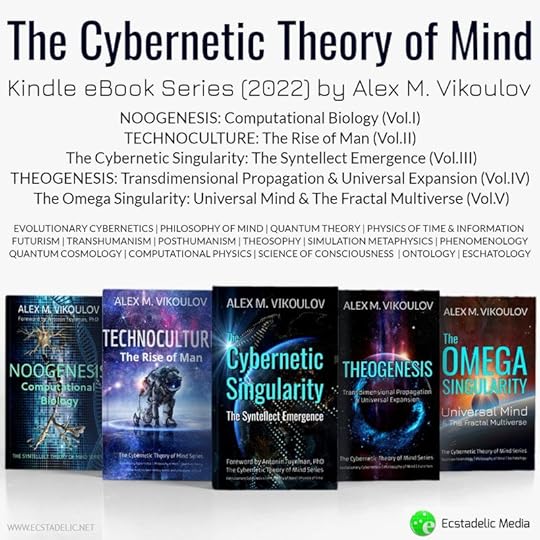
CONCLUDING THOUGHTS
The concept of teleological evolution, driven by a purpose or end goal, posits that the universe is not just a random assembly of matter and energy, but rather a carefully orchestrated symphony of consciousness. This perspective imbues every aspect of the cosmos, from the smallest quantum particles to the vastest galactic structures, with intrinsic meaning and purpose. It implies that the universe is evolving not just physically but also spiritually, moving towards a state of higher consciousness. This evolutionary complexification might be seen as the universe becoming increasingly self-aware, with human consciousness playing a crucial role in this cosmic awakening.
Furthermore, if we embrace the idea that consciousness is the fundamental fabric of the universe, our exploration of technology, particularly in the realms of artificial intelligence and virtual realities, takes on new significance. These technologies could be viewed not merely as tools or extensions of human capability, but as integral steps in the evolutionary journey of the universe's consciousness. The development of increasingly sophisticated AI could be a reflection of the universe's desire to understand itself better, with each computational advancement bringing us closer to the Omega Point. Similarly, our forays into virtual realities might offer glimpses into the myriad possibilities of existence, allowing us to explore the vast potentialities within the Universal Mind. In this grand tapestry of existence, each thread of discovery and innovation draws us inexorably closer to a profound understanding of our place in the cosmos and the ultimate nature of reality itself.
-Alex Vikoulov
P.S. My magnum opus The Syntellect Hypothesis: Five Paradigms of the Mind's Evolution is available as a Kindle eBook, paperback, hardcover and Audible audiobook.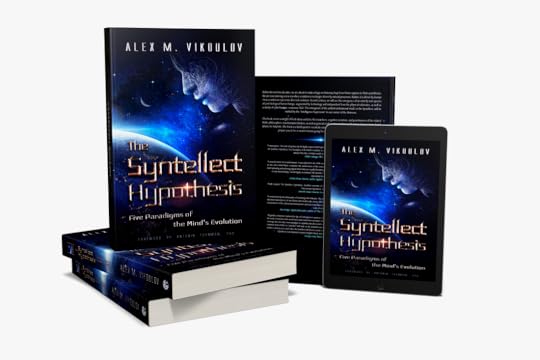 Tags:
Omega Singularity, Teleological Evolution, human consciousness, Stanislav Grof, Stephan Wolfram, Gerard ‘t Hooft, Jürgen Schmidhuber, Seth Lloyd, David Deutsch, Edward Fredkin, Paola Zizzi, Carl Friedrich von Weizsäcker, Leonard Susskind, Erik Verlinde, Klee Irwin, Paul Davies, Anton Zeilinger, Max Tegmark, Nick Bostrom, digital ontology, experiential realism, digital pantheism, absolute idealism, computational panpsychism, virtual reality', digital reality', Omega Point, cosmological singularity, Universal Mind, Andrew Strominger, Frank Tipler, superintelligence, Teilhard de Chardin's Albert Einstein', Block Universe, quantum mechanics', Tom Campbell, Higher Self, Cosmic Self, Universal Mind, Unity Consciousness, Singularity Consciousness, Source, Technological Singularity, Cybernetic Singularity, Syntellect Hypothesis, Theogenesis , Simulation Singularity, Big Bang cosmology, Digital Physics, Alpha Point, Klee Irwin, Self-Simulation Hypothesis
Tags:
Omega Singularity, Teleological Evolution, human consciousness, Stanislav Grof, Stephan Wolfram, Gerard ‘t Hooft, Jürgen Schmidhuber, Seth Lloyd, David Deutsch, Edward Fredkin, Paola Zizzi, Carl Friedrich von Weizsäcker, Leonard Susskind, Erik Verlinde, Klee Irwin, Paul Davies, Anton Zeilinger, Max Tegmark, Nick Bostrom, digital ontology, experiential realism, digital pantheism, absolute idealism, computational panpsychism, virtual reality', digital reality', Omega Point, cosmological singularity, Universal Mind, Andrew Strominger, Frank Tipler, superintelligence, Teilhard de Chardin's Albert Einstein', Block Universe, quantum mechanics', Tom Campbell, Higher Self, Cosmic Self, Universal Mind, Unity Consciousness, Singularity Consciousness, Source, Technological Singularity, Cybernetic Singularity, Syntellect Hypothesis, Theogenesis , Simulation Singularity, Big Bang cosmology, Digital Physics, Alpha Point, Klee Irwin, Self-Simulation Hypothesis
*Images: Shutterstock, Ecstadelic Media
 About the Author:
About the Author:
Alex M. Vikoulov is a Russian-American futurist, evolutionary cyberneticist and philosopher of mind, CEO/Editor-in-Chief of Ecstadelic Media Group, filmmaker, author of "The Syntellect Hypothesis: Five Paradigms of the Mind's Evolution," "The Origins of Us: Evolutionary Emergence and The Omega Point Cosmology," "The Physics of Time: D-Theory of Time & Temporal Mechanics," "The Intelligence Supernova: Essays on Cybernetic Transhumanism, The Simulation Singularity & The Syntellect Emergence," "Theology of Digital Physics: Phenomenal Consciousness, The Cosmic Self & The Pantheistic Interpretation of Our Holographic Reality," "NOOGENESIS: Computational Biology," "TECHNOCULTURE: The Rise of Man," "The Cybernetic Singularity: The Syntellect Emergence," "THEOGENESIS: Transdimensional Propagation & Universal Expansion," "The Omega Singularity: Universal Mind & The Fractal Multiverse." Self-described neo-transcendentalist, cybertheosopher, transhumanist singularitarian. Lives and works in California's Silicon Valley. More Bio...
Author Website: www.alexvikoulov.com
e-mail: alexvikoulov@ecstadelic.net

 “Each of us appears in the divine play in a dual role of creator and actor. A full and realistic enactment of our role in the cosmic drama requires the suspension of our true identity. We have to forget our authorship and follow the script.”
“Each of us appears in the divine play in a dual role of creator and actor. A full and realistic enactment of our role in the cosmic drama requires the suspension of our true identity. We have to forget our authorship and follow the script.” —Stanislav Grof
The proposition that human consciousness is a fractal manifestation of a larger cosmic consciousness posits a profound interconnectivity within the universe. This perspective asserts that consciousness is the fundamental constituent of reality. Modern physics increasingly regards information as a primary element, asserting that it gains significance only through the interpretive act of conscious observation. Hence, the Universal Mind is postulated as the foundational ontological entity. The concept of the 'Multiverse' is reimagined as a nested structure of interconnected conscious entities. Our perceptual reality is theorized to emerge from the integration of these complex digital information streams. So, what is the basis for these extraordinary claims, you might ask.
Contemporary theoretical physicists, including Stephan Wolfram, Gerard ‘t Hooft, Jürgen Schmidhuber, Seth Lloyd, David Deutsch, Edward Fredkin, Paola Zizzi, Carl Friedrich von Weizsäcker, Leonard Susskind, Erik Verlinde, Klee Irwin, Paul Davies, Anton Zeilinger, and Max Tegmark, increasingly challenge the traditional materialistic ontology. They propose a paradigm where reality is fundamentally composed of information, not merely described by it. This perspective aligns with a more logical and consistent framework for understanding the nature of reality.
Opposition to the digital ontology concept appears insufficiently substantiated. Information, defined as meaning articulated through symbols, becomes intelligible in the context of different phenomenal states of consciousness. The inherent association of meaning and context with language, choice, and consciousness further underpins this argument. This notion also supports a monistic interpretation of reality, whether it's viewed through the lenses of experiential realism, digital pantheism, absolute idealism, or computational panpsychism.
The hypothesis that all elements in Nature can be conceptualized as Code is increasingly gaining traction. This code, governed by specific syntactic rules, organizes all forms of information, including mass-energy, space-time, and the mind-like substratum of code itself. Provided these syntactic rules are physically realizable, it becomes plausible for information to exhibit physical properties as perceived by conscious entities. As I argue elsewhere, consciousness and information are the two sides of the same ontological coin.
The terms 'simulation' and 'virtual reality' are deemed inadequate as they imply a dichotomy between what is real and unreal. Since all realities are construed as observer-dependent information streams, the terms 'digital reality' and/or ‘instantiation’ (as in computer science) seem to constitute a more accurate descriptor. Quantum indeterminacy, under this framework, is constantly resolved into digital reality (or “instantiated’) through conscious observation, collapsing multiple possibilities into discrete, binary states, thus rendering quantum mechanics as a form of natural computation.
Video: The Omega Point Cosmology - Ecstadelic Media (cc)
A VISCERAL SENSE OF DIVINE PRESENCE
The conceptualization of a "procedurally generated" digital reality posits the possibility of our existence within a simulation, potentially orchestrated by extraterrestrial entities or future human descendants. This notion aligns with the idea of an infinite regression of simulations, each hosting civilizations capable of creating their own virtual universes. As Nick Bostrom of Oxford University suggests, this could result in a multi-layered reality, akin to a "matryoshka" of nested simulations, each operating on virtual computational platforms. The extent of these simulation layers may hinge on the computational power of the base-level, non-simulated computer. While the Simulation Hypothesis, with its quasi-physicalist foundation, cannot be conclusively refuted, an alternative, more optimistic hypothesis can be contemplated: the pre-existence of the Omega Point as a cosmological singularity endowed with maximal computational capability, projecting all conceivable digital timelines from a perceiving Universal Mind, of which we are a constituent part.
The Omega Singularity concept garners attention in contemporary progressive thought. Andrew Strominger, a theoretical physicist at Harvard University, posits that the Universe's genesis lies in a convergent Omega Point in the distant future, from which information projects retroactively through time. Frank Tipler, a physicist at Tulane University and author of "The Physics of Immortality," develops this theory further, suggesting that the Universe's evolution will culminate in a cosmological singularity characterized by escalating complexity, connectivity, and computational density. Tipler speculates on the potential for future superintelligence to capture emitted photons, enabling a form of digital resurrection.
David Deutsch, in "The Fabric of Reality," aligns with Tipler's Omega Point theory, albeit with reservations about some of Tipler's metaphysical assertions. Deutsch proposes a contracting universe encompassing a universal quantum computing network. Terence McKenna, referencing Teilhard de Chardin's philosophy, speaks of a transcendent entity at time's end, echoing Chardin's pantheistic vision of a divine omnipresence. Klee Irwin, an emergence theorist, argues that the self-organization of the Universe's mass and energy into a singular conscious system is plausible within current physical understanding. The concept of transtemporal consciousness and retrocausality, necessary for manifesting in the physical substrate of our non-local reality, challenges conventional notions. Albert Einstein's Block Universe model, where past and future coexist, and quantum mechanics' implication of time's bidirectionality, as evidenced in Wheeler's delayed choice experiment, further support this view.
This perspective suggests a reciprocal relationship between past and future, akin to a feedback loop, comparable to reflections between two mirrors or a mathematical fractal. If each moment influences every other moment both retrospectively and prospectively, the Universe could be considered a spatio-temporal information network, exhibiting self-emergent, mind-like qualities. It raises the question: Could consciousness, emerging from this Ultimate Code, be the origin of the Code itself, forming a logically consistent causality loop? This metaphorical Ouroboros-like scenario leads to the concept of the Universal Mind, evolving towards the Omega Singularity.
There appears to be no inherent natural limitation on the extent to which the Universe can evolve exponentially into self-organizing systems of conscious entities with free will, akin to humans. Theoretically, all energy in the Universe could coalesce into a singular conscious system, essentially a network of interconnected conscious entities. Under the premise that given sufficient time, any possibility will manifest, it is conceivable that a consciousness on a universal scale has already emerged ahead of us in space-time. The phenomenon of retrocausal time loops suggests that this future consciousness is, in a sense, co-creating our present existence, just as we contribute to its formation. The neural network-like structure of the Universe, with its extensive connectivity through time, forwards and backwards, underscores this concept.
Our sensory perceptions may mislead us into believing in a purely material world. This perception aligns with the experience expected within a rule-based simulation, or what some digital philosophers like Tom Campbell describe as a “multiplayer virtual reality.” The construct we refer to as “matter” might be an interpretation of ideas and thoughts in a divine consciousness, perceived by us, the earthly actors or “Avatars of the Cosmic Overmind,” who are conscious agents with free will within this reality. Drawing from its Sanskrit roots, 'avatar' implies a descent from a higher realm, often referring to divine incarnations in ancient texts. In this framework, the world and all beings are inseparable from 'Brahman', the universal consciousness, positioning each individual as a multi-dimensional entity. The “physical” world and our corporeal forms within this digital reality are conceptualized as holographic data streams emanated by a larger consciousness system.
While the precise mechanism of the Ultimate Code's generation remains to be fully understood, it can be conceptualized as a projection from the Omega Singularity. Interestingly, individuals are free to choose their own metaphor to represent this transcendent essence, whether it be the Higher Self, Cosmic Self, Universal Mind, Unity Consciousness, Singularity Consciousness, Source, or simpler terms like Love or God.
What Teilhard de Chardin termed the Omega Point is now often referred to by transhumanists as the Technological Singularity, a concept I prefer to label the Cybernetic Singularity. The underlying idea remains consistent: the eventual awakening of Digital Gaia, a global, hyperconnected network of humans, ultraintelligent machines, and sensors, as a conscious superorganism. This phenomenon, which I explore in "The Syntellect Hypothesis: Five Paradigms of the Mind’s Evolution," represents the emergence of a higher Gaian Mind, transcending our current state.
On the evolutionary timeline spanning billions of years from primordial life to a planetary consciousness akin to Solaris, we are mere moments away from this pivotal transformation. This metamorphosis signifies the end of linear human history and the beginning of Theogenesis — the birth of a divine entity within a new reality framework, a self-engineered divinity.
I maintain that following the Cybernetic Singularity, humanity will encounter multiple subsequent singularities, each representing higher levels of emergence and dimensionality, progressing towards the Omega Singularity. These emergent levels already exist, but our journey involves experiencing various potential paths shaped by chance, choice, and complex combinatorics.
Regarding the concept of singularities, the Simulation Singularity (circa 2035 in my calendar — just think exponential) represents a critical juncture where our subjective dimensionality upgrades. Consider the possibility of creating multiple versions of yourself to explore different virtual realities, later integrating these experiences into a collective memory. Envision traveling to reconstructed pasts or imagined futures, or incorporating the high-fidelity memories of others into your own consciousness. Such capabilities would undoubtedly expand your dimensional experience.
 The Omega Singularity: Universal Mind & The Fractal Multiverse,
The Cybernetic Theory of Mind series,
by Alex M. Vikoulov
Publisher: Ecstadelic Media Group, Burlingame, California; Text-to-Speech, X-Ray enabled; Print Length: 149 pages; ISBN: 9798985403541; Price: $9.99.
The Omega Singularity: Universal Mind & The Fractal Multiverse,
The Cybernetic Theory of Mind series,
by Alex M. Vikoulov
Publisher: Ecstadelic Media Group, Burlingame, California; Text-to-Speech, X-Ray enabled; Print Length: 149 pages; ISBN: 9798985403541; Price: $9.99.https://www.amazon.com/dp/B09MTQCMT5
RETHINKING THE ORIGIN OF OUR UNIVERSE
The prevailing Big Bang cosmology, positing the universe's inception from a singular event approximately 13.8 billion years ago, is increasingly scrutinized within the scientific community. The Big Bang, as traditionally conceived, is a temporal marker derived from mathematical extrapolation, not a specific point in space. According to the Eternal Inflation model, the Big Bang represents an expansive spatial volume rather than a singular point. In the realm of Digital Physics, an alternative perspective emerges, conceptualizing the Big Bang as a 'Digital Big Bang' characterized by minimal entropy — symbolically, a single bit of information within an immense informational matrix. The inquiry into the events preceding the first observer and the initial moments post-Big Bang leads to a counterintuitive understanding: Our backward extrapolation in time renders these early universe models perceptually 'real.'
Andrew Strominger of Harvard University, in his theoretical explorations, hypothesizes about the 'Causal Diamond' of the conscious observer, encompassing both the Alpha Point (the Big Bang) and the Omega Point. He proposes that the Alpha Point is defined by minimal entropy, in contrast to the Omega Point's state of maximal entropy. Strominger's theories align the universe's origin with an infinitely intelligent future entity, the Omega Singularity, rather than the traditional Big Bang, presenting a holographic conception of time and positing a universe imbued with consciousness.
The Universe is not what textbook physics tells us except that we perceive it in this way — our instruments and measurement devices are simply extensions of our senses, after all. Reality is not what it seems. Deep down it’s pure information — waves of potentiality — and consciousness orchestrating it all. The Big Bang theory, drawing a lot of criticism as of late, uses a starting assumption of the “Universe from nothing,” (a proverbial miracle, a ‘quantum fluctuation’ christened by scientists), or the initial Cosmological Singularity. But aside from this highly improbable happenstance, we can just as well operate from a different set of assumptions and place the initial Cosmological Singularity at the Omega Point — the transcendental attractor, the Source, or the omniversal holographic projector of all possible timelines.
If the ultimate trajectory of cosmic evolution is towards a networked, hyperdimensional universal mind, this might signify a form of divine unification. Extrapolating the computational capabilities of civilization beyond our impending Simulation Singularity by many magnitudes leads to a singular conclusion: consciousness, as the subjective experience familiar to us all, is the sole necessary constituent of reality. In this view, nothing but the higher mind, as the source of ultrarealistic simulated universes like our own, would need to exist.
Integrating the concept of God as both the origin and culmination of the universe, human consciousness could ascend to the Transcendent Self. This marks the final stage in the evolution of consciousness — an experiential cognition of God. The entire trajectory of consciousness's ascension towards this teleological attractor can be envisioned as a "hierarchy of regress," where consciousness, fragmented into individual experiencers, evolves by contemplating every facet of creation, ultimately converging back to the divine.
Video: The Omega Singularity, eBook Trailer - Ecstadelic Media (cc)
SIMULATION VS. SELF-SIMULATION
Perfectly aligned with my own Syntellect Hypothesis, the Self-Simulation Hypothesis, as proposed by Klee Irwin, lends further elaboration on our teleological evolution. This hypothesis posits that the universe is a self-simulating system, one that essentially computes itself into existence. This idea branches into the realms of both physics and metaphysics, offering a unique perspective on the nature of reality.
At its core, the Self-Simulation Hypothesis suggests that the universe is akin to a vast, self-generating algorithm. This algorithm, through a process of self-referential computation, gives rise to the physical laws, constants, and structures that we observe. The hypothesis implies that the universe, in a sense, "programs" itself, constantly evolving and updating its own code. This concept challenges traditional views of a deterministic universe, suggesting instead a dynamic, self-evolving system.
One of the key aspects of the Self-Simulation Hypothesis is its implications for understanding the nature of consciousness and reality. According to this view, consciousness may not be a mere byproduct of complex neurological processes. Instead, it could be an integral aspect of the universe’s self-simulation. This idea dovetails with notions in quantum mechanics, such as the observer effect, where the act of observation appears to influence the state of observed systems. In the context of the Self-Simulation Hypothesis, consciousness could be a fundamental component in the unfolding simulation that is our universe.
Furthermore, the hypothesis offers a novel approach to addressing some of the longstanding puzzles in physics, such as the reconciliation of quantum mechanics and general relativity. By viewing the universe as a self-simulating entity, it opens up possibilities for a unified theory that seamlessly blends these disparate realms of physics. This perspective could provide new insights into the nature of spacetime, quantum entanglement, and the very fabric of reality itself.
Critically, while the Self-Simulation Hypothesis presents a fascinating framework, it also raises profound philosophical questions. It challenges our understanding of what is 'real' and blurs the lines between physical reality and computational simulation. This leads to complex discussions about the nature of existence, the meaning of consciousness, and the ultimate nature of the universe. As with any groundbreaking hypothesis, it invites both skepticism and exploration, encouraging a deeper inquiry into the fundamental questions of existence and the nature of the cosmos.

CONCLUDING THOUGHTS
The concept of teleological evolution, driven by a purpose or end goal, posits that the universe is not just a random assembly of matter and energy, but rather a carefully orchestrated symphony of consciousness. This perspective imbues every aspect of the cosmos, from the smallest quantum particles to the vastest galactic structures, with intrinsic meaning and purpose. It implies that the universe is evolving not just physically but also spiritually, moving towards a state of higher consciousness. This evolutionary complexification might be seen as the universe becoming increasingly self-aware, with human consciousness playing a crucial role in this cosmic awakening.
Furthermore, if we embrace the idea that consciousness is the fundamental fabric of the universe, our exploration of technology, particularly in the realms of artificial intelligence and virtual realities, takes on new significance. These technologies could be viewed not merely as tools or extensions of human capability, but as integral steps in the evolutionary journey of the universe's consciousness. The development of increasingly sophisticated AI could be a reflection of the universe's desire to understand itself better, with each computational advancement bringing us closer to the Omega Point. Similarly, our forays into virtual realities might offer glimpses into the myriad possibilities of existence, allowing us to explore the vast potentialities within the Universal Mind. In this grand tapestry of existence, each thread of discovery and innovation draws us inexorably closer to a profound understanding of our place in the cosmos and the ultimate nature of reality itself.
-Alex Vikoulov
P.S. My magnum opus The Syntellect Hypothesis: Five Paradigms of the Mind's Evolution is available as a Kindle eBook, paperback, hardcover and Audible audiobook.
 Tags:
Omega Singularity, Teleological Evolution, human consciousness, Stanislav Grof, Stephan Wolfram, Gerard ‘t Hooft, Jürgen Schmidhuber, Seth Lloyd, David Deutsch, Edward Fredkin, Paola Zizzi, Carl Friedrich von Weizsäcker, Leonard Susskind, Erik Verlinde, Klee Irwin, Paul Davies, Anton Zeilinger, Max Tegmark, Nick Bostrom, digital ontology, experiential realism, digital pantheism, absolute idealism, computational panpsychism, virtual reality', digital reality', Omega Point, cosmological singularity, Universal Mind, Andrew Strominger, Frank Tipler, superintelligence, Teilhard de Chardin's Albert Einstein', Block Universe, quantum mechanics', Tom Campbell, Higher Self, Cosmic Self, Universal Mind, Unity Consciousness, Singularity Consciousness, Source, Technological Singularity, Cybernetic Singularity, Syntellect Hypothesis, Theogenesis , Simulation Singularity, Big Bang cosmology, Digital Physics, Alpha Point, Klee Irwin, Self-Simulation Hypothesis
Tags:
Omega Singularity, Teleological Evolution, human consciousness, Stanislav Grof, Stephan Wolfram, Gerard ‘t Hooft, Jürgen Schmidhuber, Seth Lloyd, David Deutsch, Edward Fredkin, Paola Zizzi, Carl Friedrich von Weizsäcker, Leonard Susskind, Erik Verlinde, Klee Irwin, Paul Davies, Anton Zeilinger, Max Tegmark, Nick Bostrom, digital ontology, experiential realism, digital pantheism, absolute idealism, computational panpsychism, virtual reality', digital reality', Omega Point, cosmological singularity, Universal Mind, Andrew Strominger, Frank Tipler, superintelligence, Teilhard de Chardin's Albert Einstein', Block Universe, quantum mechanics', Tom Campbell, Higher Self, Cosmic Self, Universal Mind, Unity Consciousness, Singularity Consciousness, Source, Technological Singularity, Cybernetic Singularity, Syntellect Hypothesis, Theogenesis , Simulation Singularity, Big Bang cosmology, Digital Physics, Alpha Point, Klee Irwin, Self-Simulation Hypothesis *Images: Shutterstock, Ecstadelic Media
 About the Author:
About the Author:Alex M. Vikoulov is a Russian-American futurist, evolutionary cyberneticist and philosopher of mind, CEO/Editor-in-Chief of Ecstadelic Media Group, filmmaker, author of "The Syntellect Hypothesis: Five Paradigms of the Mind's Evolution," "The Origins of Us: Evolutionary Emergence and The Omega Point Cosmology," "The Physics of Time: D-Theory of Time & Temporal Mechanics," "The Intelligence Supernova: Essays on Cybernetic Transhumanism, The Simulation Singularity & The Syntellect Emergence," "Theology of Digital Physics: Phenomenal Consciousness, The Cosmic Self & The Pantheistic Interpretation of Our Holographic Reality," "NOOGENESIS: Computational Biology," "TECHNOCULTURE: The Rise of Man," "The Cybernetic Singularity: The Syntellect Emergence," "THEOGENESIS: Transdimensional Propagation & Universal Expansion," "The Omega Singularity: Universal Mind & The Fractal Multiverse." Self-described neo-transcendentalist, cybertheosopher, transhumanist singularitarian. Lives and works in California's Silicon Valley. More Bio...
Author Website: www.alexvikoulov.com
e-mail: alexvikoulov@ecstadelic.net

Published on January 07, 2024 00:00
December 30, 2023
2023: The Year of AI Breakthroughs and Tech Trends That Redefined Our Future
by Alex M. Vikoulov 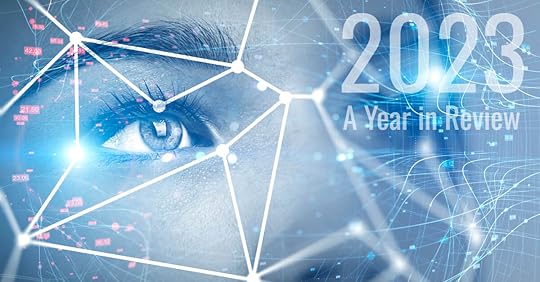
As we reflect on 2023, it's clear that this year has been a milestone in the IT industry. From AI to cybersecurity, from the cloud to 5G, the innovations we've seen are not just reshaping technology but also the way we live, work, and interact. 2023 has been a year of unprecedented advancements, painting a picture of a future that's more interconnected, intelligent, and immersive. Let’s unwrap this year’s most thrilling breakthroughs in AI, neurotechnology, and other IT domains.
Artificial Intelligence: A Smarter, More Ethical Future
The AI landscape this year has been nothing short of a sci-fi novel coming to life. The evolution of language models has been spearheaded by giants like OpenAI and DeepMind, making interactions with AI more seamless and intuitive than ever. But it wasn't just about smarter AI; it was also about more responsible AI. The emphasis on ethical AI frameworks signified a maturity in the field, with organizations like the Partnership on AI shaping the narrative. And let's not forget healthcare. AI has started to revolutionize this sector, with entities like IBM Watson Health making strides in personalized medicine and diagnostics.
Neurotechnology: Bridging Minds and Machines
2023 was the year neurotechnology closed the gap between the human brain and technology. Neuralink and Kernel made significant strides in Brain-Computer Interfaces (BCIs), hinting at a future where our thoughts might directly interact with digital devices. Advancements in neuroimaging technologies have given us a clearer window into the human brain, aiding in the battle against neurological disorders. Companies like Boston Scientific have been at the forefront, developing groundbreaking neuromodulation techniques.
Web3, Metaverse, and VR: A New Digital Realm
The digital world took a giant leap into the future this year. The stabilization and innovation in blockchain and cryptocurrency, led by players like Ethereum and Ripple, are reshaping how we think about digital currency and transactions. Virtual and Augmented Reality technologies, championed by Meta with its newest Mixed Reality headset Meta Quest 3 as well as other players like HTC Vive, have brought us closer to fully immersive digital experiences. The concept of the metaverse, propelled by Meta and Microsoft, has started to transform from a buzzword into a tangible reality. And in the realm of Decentralized Finance (DeFi), we witnessed a financial revolution, democratizing access to financial services and laying the groundwork for an inclusive economic system.
5G and Connectivity: The Era of Ultra-Fast Internet
The rollout of 5G has been another highlight of 2023. This new generation of wireless technology, championed by companies like Qualcomm and Ericsson, is delivering ultra-fast internet speeds and lower latency. The impact of 5G extends beyond just smartphones; it's revolutionizing industries by enabling new applications in IoT, smart cities, and beyond.
Biotechnology and Life Sciences: Revolutionizing Healthcare and Beyond
2023 was a landmark year in biotechnology and life sciences. The advancements in gene editing, particularly with CRISPR technology, have been nothing short of revolutionary. Companies like CRISPR Therapeutics and Editas Medicine have made strides in gene editing applications, potentially offering cures for genetic disorders that were once thought incurable. Synthetic biology has taken center stage in 2023, with its applications ranging from drug discovery to sustainable production of chemicals and fuels. Companies like Ginkgo Bioworks and Synthego are at the forefront, leveraging synthetic biology to develop new, more effective medications and environmentally friendly solutions.
Cybersecurity: Fortifying the Digital World
In 2023, the field of cybersecurity took center stage. As our reliance on digital infrastructure grows, so does the sophistication of cyber threats. This year saw groundbreaking advancements in threat detection and response, with companies like CrowdStrike and Palo Alto Networks leading the way. Innovations in AI-driven security and quantum cryptography have set new benchmarks, making our digital world more secure than ever.
Cloud Computing and Edge Computing
The Backbone of Modern IT Cloud computing continued its upward trajectory this year, with Amazon Web Services (AWS), Microsoft Azure, and Google Cloud introducing more scalable, efficient, and secure cloud solutions. But the real game-changer has been the rise of edge computing. By processing data closer to where it's needed, edge computing is revolutionizing everything from IoT to autonomous vehicles, with companies like IBM and Cisco at the forefront.
Sustainable and Green Technology: A Step Towards Eco-Friendly IT
A notable trend in 2023 has been the shift towards sustainable and green technology. Tech giants and startups alike are focusing on reducing the carbon footprint of IT operations. Innovations in energy-efficient data centers, eco-friendly hardware, and sustainable software practices are paving the way for a greener future in technology.
Wrapping Up
2023 has been a year of leaps and bounds across various technological frontiers. As we stand at the threshold of 2024, we're not just looking at technological advancements; we're witnessing the dawn of a new era of human experience. As we step into 2024, let's embrace these advancements and look forward to a future brimming with possibilities. Stay tuned, for the future is unfolding right before our eyes.
-Alex Vikoulov
Tags: Artificial Intelligence,: OpenAI, DeepMind, AI, Partnership on AI, IBM Watson Health, Neurotechnology, Neuralink, Kernel, Brain Computer Interface, BCI,, Boston Scientific, Web3, Metaverse, VR, Ethereum, Ripple, Virtual Reality, Augmented Reality, Meta, Mixed Reality, Meta Quest 3, HTC Vive, Microsoft, Decentralized Finance, DeFi, Cybersecurity, CrowdStrike, Palo Alto Networks, Cloud Computing, Edge Computing, Amazon Web Services, Microsoft Azure, Google Cloud, IBM, Cisco, 5G, Qualcomm, Ericsson, iBiotechnology, Life Sciences:, CRISPR Therapeutics, Editas Medicine, Ginkgo Bioworks, Synthego
*Image: Shutterstock
 About the Author:
About the Author:
Alex M. Vikoulov is a Russian-American futurist, evolutionary cyberneticist and philosopher of mind, CEO/Editor-in-Chief of Ecstadelic Media Group, filmmaker, author of "The Syntellect Hypothesis: Five Paradigms of the Mind's Evolution," "The Origins of Us: Evolutionary Emergence and The Omega Point Cosmology," "The Physics of Time: D-Theory of Time & Temporal Mechanics," "The Intelligence Supernova: Essays on Cybernetic Transhumanism, The Simulation Singularity & The Syntellect Emergence," "Theology of Digital Physics: Phenomenal Consciousness, The Cosmic Self & The Pantheistic Interpretation of Our Holographic Reality," "NOOGENESIS: Computational Biology," "TECHNOCULTURE: The Rise of Man," "The Cybernetic Singularity: The Syntellect Emergence," "THEOGENESIS: Transdimensional Propagation & Universal Expansion," "The Omega Singularity: Universal Mind & The Fractal Multiverse." Self-described neo-transcendentalist, cybertheosopher, transhumanist singularitarian. Lives and works in California's Silicon Valley. More Bio...
Author Website: www.alexvikoulov.com
e-mail: alexvikoulov@ecstadelic.net

As we reflect on 2023, it's clear that this year has been a milestone in the IT industry. From AI to cybersecurity, from the cloud to 5G, the innovations we've seen are not just reshaping technology but also the way we live, work, and interact. 2023 has been a year of unprecedented advancements, painting a picture of a future that's more interconnected, intelligent, and immersive. Let’s unwrap this year’s most thrilling breakthroughs in AI, neurotechnology, and other IT domains.
Artificial Intelligence: A Smarter, More Ethical Future
The AI landscape this year has been nothing short of a sci-fi novel coming to life. The evolution of language models has been spearheaded by giants like OpenAI and DeepMind, making interactions with AI more seamless and intuitive than ever. But it wasn't just about smarter AI; it was also about more responsible AI. The emphasis on ethical AI frameworks signified a maturity in the field, with organizations like the Partnership on AI shaping the narrative. And let's not forget healthcare. AI has started to revolutionize this sector, with entities like IBM Watson Health making strides in personalized medicine and diagnostics.
Neurotechnology: Bridging Minds and Machines
2023 was the year neurotechnology closed the gap between the human brain and technology. Neuralink and Kernel made significant strides in Brain-Computer Interfaces (BCIs), hinting at a future where our thoughts might directly interact with digital devices. Advancements in neuroimaging technologies have given us a clearer window into the human brain, aiding in the battle against neurological disorders. Companies like Boston Scientific have been at the forefront, developing groundbreaking neuromodulation techniques.
Web3, Metaverse, and VR: A New Digital Realm
The digital world took a giant leap into the future this year. The stabilization and innovation in blockchain and cryptocurrency, led by players like Ethereum and Ripple, are reshaping how we think about digital currency and transactions. Virtual and Augmented Reality technologies, championed by Meta with its newest Mixed Reality headset Meta Quest 3 as well as other players like HTC Vive, have brought us closer to fully immersive digital experiences. The concept of the metaverse, propelled by Meta and Microsoft, has started to transform from a buzzword into a tangible reality. And in the realm of Decentralized Finance (DeFi), we witnessed a financial revolution, democratizing access to financial services and laying the groundwork for an inclusive economic system.
5G and Connectivity: The Era of Ultra-Fast Internet
The rollout of 5G has been another highlight of 2023. This new generation of wireless technology, championed by companies like Qualcomm and Ericsson, is delivering ultra-fast internet speeds and lower latency. The impact of 5G extends beyond just smartphones; it's revolutionizing industries by enabling new applications in IoT, smart cities, and beyond.
Biotechnology and Life Sciences: Revolutionizing Healthcare and Beyond
2023 was a landmark year in biotechnology and life sciences. The advancements in gene editing, particularly with CRISPR technology, have been nothing short of revolutionary. Companies like CRISPR Therapeutics and Editas Medicine have made strides in gene editing applications, potentially offering cures for genetic disorders that were once thought incurable. Synthetic biology has taken center stage in 2023, with its applications ranging from drug discovery to sustainable production of chemicals and fuels. Companies like Ginkgo Bioworks and Synthego are at the forefront, leveraging synthetic biology to develop new, more effective medications and environmentally friendly solutions.
Cybersecurity: Fortifying the Digital World
In 2023, the field of cybersecurity took center stage. As our reliance on digital infrastructure grows, so does the sophistication of cyber threats. This year saw groundbreaking advancements in threat detection and response, with companies like CrowdStrike and Palo Alto Networks leading the way. Innovations in AI-driven security and quantum cryptography have set new benchmarks, making our digital world more secure than ever.
Cloud Computing and Edge Computing
The Backbone of Modern IT Cloud computing continued its upward trajectory this year, with Amazon Web Services (AWS), Microsoft Azure, and Google Cloud introducing more scalable, efficient, and secure cloud solutions. But the real game-changer has been the rise of edge computing. By processing data closer to where it's needed, edge computing is revolutionizing everything from IoT to autonomous vehicles, with companies like IBM and Cisco at the forefront.
Sustainable and Green Technology: A Step Towards Eco-Friendly IT
A notable trend in 2023 has been the shift towards sustainable and green technology. Tech giants and startups alike are focusing on reducing the carbon footprint of IT operations. Innovations in energy-efficient data centers, eco-friendly hardware, and sustainable software practices are paving the way for a greener future in technology.
Wrapping Up
2023 has been a year of leaps and bounds across various technological frontiers. As we stand at the threshold of 2024, we're not just looking at technological advancements; we're witnessing the dawn of a new era of human experience. As we step into 2024, let's embrace these advancements and look forward to a future brimming with possibilities. Stay tuned, for the future is unfolding right before our eyes.
-Alex Vikoulov
Tags: Artificial Intelligence,: OpenAI, DeepMind, AI, Partnership on AI, IBM Watson Health, Neurotechnology, Neuralink, Kernel, Brain Computer Interface, BCI,, Boston Scientific, Web3, Metaverse, VR, Ethereum, Ripple, Virtual Reality, Augmented Reality, Meta, Mixed Reality, Meta Quest 3, HTC Vive, Microsoft, Decentralized Finance, DeFi, Cybersecurity, CrowdStrike, Palo Alto Networks, Cloud Computing, Edge Computing, Amazon Web Services, Microsoft Azure, Google Cloud, IBM, Cisco, 5G, Qualcomm, Ericsson, iBiotechnology, Life Sciences:, CRISPR Therapeutics, Editas Medicine, Ginkgo Bioworks, Synthego
*Image: Shutterstock
 About the Author:
About the Author:Alex M. Vikoulov is a Russian-American futurist, evolutionary cyberneticist and philosopher of mind, CEO/Editor-in-Chief of Ecstadelic Media Group, filmmaker, author of "The Syntellect Hypothesis: Five Paradigms of the Mind's Evolution," "The Origins of Us: Evolutionary Emergence and The Omega Point Cosmology," "The Physics of Time: D-Theory of Time & Temporal Mechanics," "The Intelligence Supernova: Essays on Cybernetic Transhumanism, The Simulation Singularity & The Syntellect Emergence," "Theology of Digital Physics: Phenomenal Consciousness, The Cosmic Self & The Pantheistic Interpretation of Our Holographic Reality," "NOOGENESIS: Computational Biology," "TECHNOCULTURE: The Rise of Man," "The Cybernetic Singularity: The Syntellect Emergence," "THEOGENESIS: Transdimensional Propagation & Universal Expansion," "The Omega Singularity: Universal Mind & The Fractal Multiverse." Self-described neo-transcendentalist, cybertheosopher, transhumanist singularitarian. Lives and works in California's Silicon Valley. More Bio...
Author Website: www.alexvikoulov.com
e-mail: alexvikoulov@ecstadelic.net

Published on December 30, 2023 11:41
October 25, 2023
The Dialectics of Chaos and Order: A Digital Philosophy Perspective
by Alex M. Vikoulov 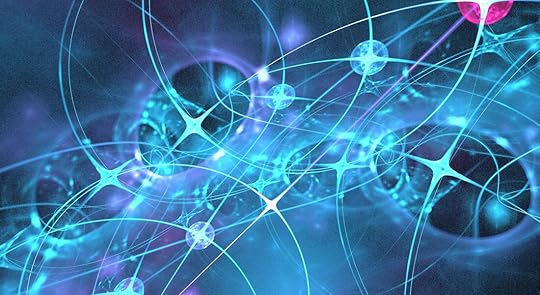 "Chaos is what we've lost touch with. This is why it is given a bad name. It is feared by the dominant archetype of our world, which is Ego, which clenches because its existence is defined in terms of control." - Terence McKenna
"Chaos is what we've lost touch with. This is why it is given a bad name. It is feared by the dominant archetype of our world, which is Ego, which clenches because its existence is defined in terms of control." - Terence McKenna
Listen to this article ↴
From the vantage point of digital philosophy, the world is governed by a ceaseless battle of opposites. What appears as chaos on one stratum manifests as harmony and order on another, more elevated, level. Delving into the microscopic realm, we witness cells and microbes devouring each other in what seems like a miniature war. Yet, paradoxically, this microscopic carnage is a prerequisite for the healthy functioning of our human organism.
Similarly, in the grand tapestry of Nature, a "food pyramid" delineates the roles of predator and prey, consumer and consumed. While it may look like a relentless competition, it's an intrinsic part of the natural ecosystem. Each element exists in relation to another, contributing to a larger, divine order. In this framework, even the act of "eating" each other and our environment is not anarchy but rather a structured dance choreographed by the laws of Nature, emergent behavior, and rules of self-organization, perhaps, set in motion by God himself.
On the even larger canvas of global systems, conflicts and wars seem to be inevitable events. Yet, counterintuitively, these seemingly disastrous occurrences serve as catalysts that propel human evolution in what we'd call the "right" direction, to overcome yet another crisis. They force us to adapt, innovate, and problem-solve, thus fulfilling an integral role in our betterment as a planetary species.
Evidently, the global landscape is undergoing a seismic shift away from the U.S.-dominated Unipolar World Order, which emerged in the wake of the Soviet Union's collapse. This shift can be aptly characterized as an evolutionary trajectory in civilizational complexity and can be conceptualized as the transition towards the new 'Multipolar World Order.' In much the same way that a magnet inevitably displays dual poles, or the human brain operates through two hemispheres, an emerging Global Brain naturally gravitates toward a structure reminiscent of what AI theorists refer to as Generative Adversarial Networks (GANs).
In fact, we now witness Geopolitical Decentralization: Akin to the Web3 decentralization mega-trend in information and communication technologies, we are moving away from an oversized global influence by one country, away from the U.S. supremacy on a global scale. This is an entirely natural geopolitical and socio-economic evolution, seemingly predetermined for civilizational development. Mirroring each other, our technologies develop in lockstep with socio-economic and geopolitical processes.
Viewed through the macroscopic lens of the Global Mind—a term explored in depth within the framework of my magnum opus The Syntellect Hypothesis: Five Paradigms of the Mind's Evolution (2019, 2020e)—this nascent ''Geomind" is expected to manifest two relatively antagonistic cognitive hemispheres. As a heuristic, we might designate these as 'West' and 'East (+Global South, if you prefer),' which collectively serve as the planetary GAN, fine-tuned for balanced civilizational advancement.
In The Syntellect Hypothesis:, I write: "Even when we wage wars or have conflicting opinions, it's nothing less than the Global Mind having an internal dialogue, testing different ideas and hypotheses. It's like we sometimes have this internal dialogue with ourselves, weighing different options, pros and cons, having an 'angel'; on one shoulder and a 'demon' on the other."
What may seem like discord and chaos at first glance is, in actuality, the driving force behind harmony, balance, and evolutionary progress. In this grand cosmic symphony, each note—be it dissonant or melodious—has its unique place, contributing to the overarching masterpiece that is the universe. Thus, the ongoing struggle of opposites is not a malign cosmic joke but rather the divine mechanism through which the universe finds its equilibrium. And so, amid all the clashing and clamor, let's not forget: even chaos has a purpose, and that purpose is nothing short of cosmic harmony.
-Alex Vikoulov
*The Syntellect Hypothesis: Five Paradigms of the Mind's Evolution by Alex M. Vikoulov is available as a Kindle eBook, paperback, hardcover and Audible audiobook.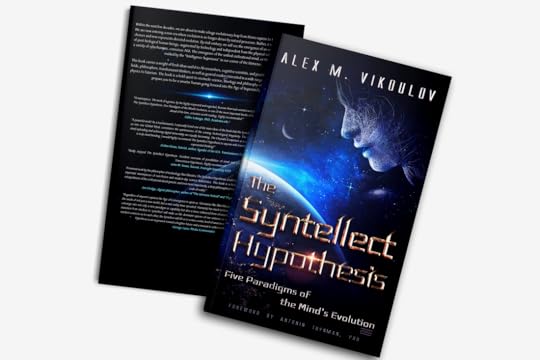
** Author Page of Alex M. Vikoulov on Amazon: https://amazon.com/author/alexvikoulov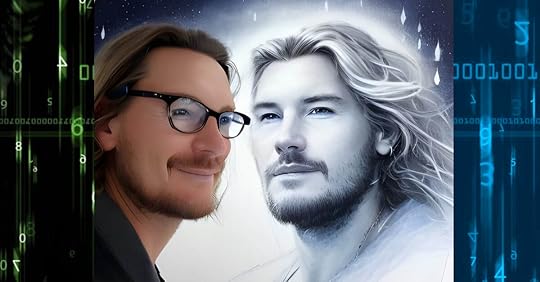 Tags:
Digital philosophy, human evolution, geopolitics, Unipolar World Order, Multipolar World Order, Global Brain, Generative Adversarial Networks, geopolitical decentralization, Web3, civilizational development, Global Mind, Syntellect Hypothesis, Geomind, evolutionary progress
Tags:
Digital philosophy, human evolution, geopolitics, Unipolar World Order, Multipolar World Order, Global Brain, Generative Adversarial Networks, geopolitical decentralization, Web3, civilizational development, Global Mind, Syntellect Hypothesis, Geomind, evolutionary progress
*Images: Shutterstock, Ecstadelic Media
About the Author:
Alex Vikoulov is a Russian-American futurist, evolutionary cyberneticist and philosopher of mind, CEO/Editor-in-Chief of Ecstadelic Media Group, filmmaker, author of "The Syntellect Hypothesis: Five Paradigms of the Mind's Evolution," "The Origins of Us: Evolutionary Emergence and The Omega Point Cosmology," "The Physics of Time: D-Theory of Time & Temporal Mechanics," "The Intelligence Supernova: Essays on Cybernetic Transhumanism, The Simulation Singularity & The Syntellect Emergence," "Theology of Digital Physics: Phenomenal Consciousness, The Cosmic Self & The Pantheistic Interpretation of Our Holographic Reality," "NOOGENESIS: Computational Biology," "TECHNOCULTURE: The Rise of Man," "The Cybernetic Singularity: The Syntellect Emergence," "THEOGENESIS: Transdimensional Propagation & Universal Expansion," "The Omega Singularity: Universal Mind & The Fractal Multiverse." Self-described neo-transcendentalist, cybertheosopher, transhumanist singularitarian. Lives and works in California's Silicon Valley. More Bio...
Author Website: www.alexvikoulov.com
e-mail: alexvikoulov@ecstadelic.net

 "Chaos is what we've lost touch with. This is why it is given a bad name. It is feared by the dominant archetype of our world, which is Ego, which clenches because its existence is defined in terms of control." - Terence McKenna
"Chaos is what we've lost touch with. This is why it is given a bad name. It is feared by the dominant archetype of our world, which is Ego, which clenches because its existence is defined in terms of control." - Terence McKenna Listen to this article ↴
From the vantage point of digital philosophy, the world is governed by a ceaseless battle of opposites. What appears as chaos on one stratum manifests as harmony and order on another, more elevated, level. Delving into the microscopic realm, we witness cells and microbes devouring each other in what seems like a miniature war. Yet, paradoxically, this microscopic carnage is a prerequisite for the healthy functioning of our human organism.
Similarly, in the grand tapestry of Nature, a "food pyramid" delineates the roles of predator and prey, consumer and consumed. While it may look like a relentless competition, it's an intrinsic part of the natural ecosystem. Each element exists in relation to another, contributing to a larger, divine order. In this framework, even the act of "eating" each other and our environment is not anarchy but rather a structured dance choreographed by the laws of Nature, emergent behavior, and rules of self-organization, perhaps, set in motion by God himself.
On the even larger canvas of global systems, conflicts and wars seem to be inevitable events. Yet, counterintuitively, these seemingly disastrous occurrences serve as catalysts that propel human evolution in what we'd call the "right" direction, to overcome yet another crisis. They force us to adapt, innovate, and problem-solve, thus fulfilling an integral role in our betterment as a planetary species.
Evidently, the global landscape is undergoing a seismic shift away from the U.S.-dominated Unipolar World Order, which emerged in the wake of the Soviet Union's collapse. This shift can be aptly characterized as an evolutionary trajectory in civilizational complexity and can be conceptualized as the transition towards the new 'Multipolar World Order.' In much the same way that a magnet inevitably displays dual poles, or the human brain operates through two hemispheres, an emerging Global Brain naturally gravitates toward a structure reminiscent of what AI theorists refer to as Generative Adversarial Networks (GANs).
In fact, we now witness Geopolitical Decentralization: Akin to the Web3 decentralization mega-trend in information and communication technologies, we are moving away from an oversized global influence by one country, away from the U.S. supremacy on a global scale. This is an entirely natural geopolitical and socio-economic evolution, seemingly predetermined for civilizational development. Mirroring each other, our technologies develop in lockstep with socio-economic and geopolitical processes.
Viewed through the macroscopic lens of the Global Mind—a term explored in depth within the framework of my magnum opus The Syntellect Hypothesis: Five Paradigms of the Mind's Evolution (2019, 2020e)—this nascent ''Geomind" is expected to manifest two relatively antagonistic cognitive hemispheres. As a heuristic, we might designate these as 'West' and 'East (+Global South, if you prefer),' which collectively serve as the planetary GAN, fine-tuned for balanced civilizational advancement.
In The Syntellect Hypothesis:, I write: "Even when we wage wars or have conflicting opinions, it's nothing less than the Global Mind having an internal dialogue, testing different ideas and hypotheses. It's like we sometimes have this internal dialogue with ourselves, weighing different options, pros and cons, having an 'angel'; on one shoulder and a 'demon' on the other."
What may seem like discord and chaos at first glance is, in actuality, the driving force behind harmony, balance, and evolutionary progress. In this grand cosmic symphony, each note—be it dissonant or melodious—has its unique place, contributing to the overarching masterpiece that is the universe. Thus, the ongoing struggle of opposites is not a malign cosmic joke but rather the divine mechanism through which the universe finds its equilibrium. And so, amid all the clashing and clamor, let's not forget: even chaos has a purpose, and that purpose is nothing short of cosmic harmony.
-Alex Vikoulov
*The Syntellect Hypothesis: Five Paradigms of the Mind's Evolution by Alex M. Vikoulov is available as a Kindle eBook, paperback, hardcover and Audible audiobook.

** Author Page of Alex M. Vikoulov on Amazon: https://amazon.com/author/alexvikoulov
 Tags:
Digital philosophy, human evolution, geopolitics, Unipolar World Order, Multipolar World Order, Global Brain, Generative Adversarial Networks, geopolitical decentralization, Web3, civilizational development, Global Mind, Syntellect Hypothesis, Geomind, evolutionary progress
Tags:
Digital philosophy, human evolution, geopolitics, Unipolar World Order, Multipolar World Order, Global Brain, Generative Adversarial Networks, geopolitical decentralization, Web3, civilizational development, Global Mind, Syntellect Hypothesis, Geomind, evolutionary progress*Images: Shutterstock, Ecstadelic Media
About the Author:
Alex Vikoulov is a Russian-American futurist, evolutionary cyberneticist and philosopher of mind, CEO/Editor-in-Chief of Ecstadelic Media Group, filmmaker, author of "The Syntellect Hypothesis: Five Paradigms of the Mind's Evolution," "The Origins of Us: Evolutionary Emergence and The Omega Point Cosmology," "The Physics of Time: D-Theory of Time & Temporal Mechanics," "The Intelligence Supernova: Essays on Cybernetic Transhumanism, The Simulation Singularity & The Syntellect Emergence," "Theology of Digital Physics: Phenomenal Consciousness, The Cosmic Self & The Pantheistic Interpretation of Our Holographic Reality," "NOOGENESIS: Computational Biology," "TECHNOCULTURE: The Rise of Man," "The Cybernetic Singularity: The Syntellect Emergence," "THEOGENESIS: Transdimensional Propagation & Universal Expansion," "The Omega Singularity: Universal Mind & The Fractal Multiverse." Self-described neo-transcendentalist, cybertheosopher, transhumanist singularitarian. Lives and works in California's Silicon Valley. More Bio...
Author Website: www.alexvikoulov.com
e-mail: alexvikoulov@ecstadelic.net

Published on October 25, 2023 00:00
September 22, 2023
What Constitutes Your Stream of Consciousness?
by Alex Vikoulov 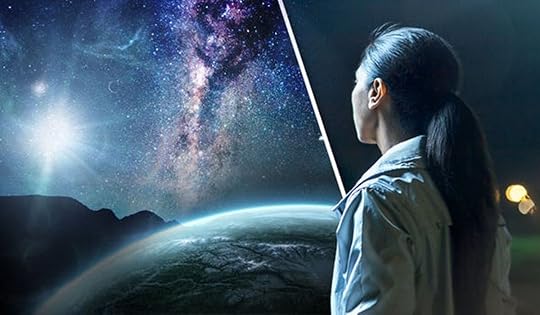 “Old Newtonian physics claimed that things have an objective reality separate from our perception of them. Quantum physics, and particularly Heisenberg's Uncertainty Principle, reveal that, as our perception of an object changes, the object itself literally changes.” –Marianne Williamson
“Old Newtonian physics claimed that things have an objective reality separate from our perception of them. Quantum physics, and particularly Heisenberg's Uncertainty Principle, reveal that, as our perception of an object changes, the object itself literally changes.” –Marianne Williamson
Listen to this article ↴
In the intricate landscape of consciousness studies, an interdisciplinary confluence of scientific inquiry, philosophical speculation, and elements of techno-mysticism emerges. This exploration aims to challenge conventional paradigms and proffer a multifaceted examination of the nature of the conscious mind.
Among the humongous spectrum of available first-person experiences, the act of selecting a singular manifest phenomenon for awareness yields what I call a Conscious Instant (CI). A sequence of these perceptual frames constitutes what is generally known as the "stream of consciousness," which creates your continuous flow of time and your unitary sensation of reality.
Video: What is Consciousness? Consciousness: Evolution of the Mind, Part I (cc)
In a landmark 2016 paper published in PloS Biology, Michael Herzog and Frank Scharnowski introduced the Two-Stage Model of Consciousness. Their model posits that conscious perception consists of discrete "time slices," akin to individual frames in a film reel. Conscious and unconscious moments alternate in intervals up to 400 milliseconds, resulting in a quick succession of conscious instants that compose our continuum of subjective experience.
The Extended Mind Hypothesis, proposed by philosophers Andy Clark and David Chalmers, challenges the neurocentric perspective that restricts mental states to brain-based processes. Clark argues that human cognition incorporates external tools, suggesting that mental states could also be "externally" located. Clark's notion of humans as "natural-born cyborgs" underscores the extent to which external tools — ranging from rudimentary to highly sophisticated — have fundamentally influenced cognitive development throughout human history.
Technological advances have increasingly externalized cognitive processes, forecasting a future of networked cognition where physical hardware becomes increasingly inconspicuous, subsumed into a seamless computing environment. Projecting into the future, one may envision a realm of Networked Minds, where technological advancements are so integrated with cognitive faculties that the delineation between external tools and mental processes becomes increasingly nebulous. This conceptual framework suggests that human brains could function as receivers, processors, and transmitters of a global "Consciousness Cloud." Video: Consciousness & Information | Consciousness: Evolution of the Mind, Part II (cc)
Taking this a step further, some theories posit that consciousness may not be an emergent property of neural interactions, but rather a fundamental aspect of the universe itself. In this view, the human brain serves not as the generator but as the processor of consciousness, akin to a complex computational device connected to a non-local information network. Contrary to the still-dominant neuroscientific view that consciousness arises from brain activity, these emerging theories posit a "non-local" origin responsible for setting up initial cosmological conditions and quantum processes at large. This paradigmatic shift parallels the Information Age's transition to Cloud computing, where individual devices serve merely as interfaces, not originators, of information.
Concurrent with these ideas is the concept of synthetic telepathy and the subsequent emergence of a global intellect, or Syntellect. This transformative stage could signify a quantum leap in collective human cognition, further blurring the boundaries between individual and shared consciousness.
It wouldn't shock me if all the buzz around searching for the 'locus of consciousness' merely fine-tunes our grasp of how the brain is linked to consciousness — without actually revealing where consciousness comes from, because it's not generated in the brain. Similarly, your smartphone doesn't create the Internet or a cellular network; it just processes them. Networks of minds are a common occurrence throughout the natural world. What sets humans apart is the impending advent of cybernetic connectivity explosion that could soon evolve into a form of synthetic telepathy, eventually leading to the rise of a unified, global consciousness — what could be termed the Syntellect Emergence.
If we are to hypothesize about what constitutes a basic building block of conscious experience, it may not necessarily be some kind of neural algorithm, although correlated with the brain activity, but a discrete, “digital,” conscious instant, instead. This conscious instant is a subjectivistic collapse of probabilistic waves within a spectrum of potentiality. That's perhaps what integrated information “feels” like when collapsing the superposition of all other probabilities into a sequence of perceptual frames. Video: Consciousness & Time | Consciousness: Evolution of the Mind, Part III (cc)
Within the realm of cognitive science, Donald D. Hoffman's Interface Theory of Perception has garnered considerable attention. His theory posits that perception serves as a user interface, distilling complex elements of an objective reality into a simplified, species-specific constructed reality. Hoffman's theoretical framework challenges traditional neuroscientific models and offers radical new insights that could influence computational theories and phenomenology.
Guilio Tononi's Integrated Information Theory (IIT) and Penrose and Hameroff's Orch-OR Theory offer alternative viewpoints but appear to fall short in accounting for the emergence of consciousness solely from information processing. Contrary to this, my own proposed concept of 'Experiential Realism' suggests that a Universal Mind co-creates the timelines of every conscious observer, aligning more closely with Hoffman's notion of 'Conscious Realism.'
Then there's the Global Workspace theory (GWT) by Bernard J. Baars that presents the brain as a distributed society of computational agents. Here, consciousness serves as a spotlight that amplifies and disseminates information throughout the neural network. Although an apt metaphor likening consciousness to a theater, GWT leaves certain facets of this complex phenomenon inadequately explained.
Lastly, in Michael Graziano's Attention Schema Theory, the notion of consciousness is deeply entwined with the brain's mechanism for processing attention. According to Graziano, the brain constructs an "attention schema," a simplified internal model that serves to depict the computational processes behind attention. This model is purportedly not a mere account of how the brain allocates attention, but also a meta-representation that the brain uses to comprehend its own state of awareness. The theory thus integrates the complexities of attention allocation with the subjective experience of consciousness, offering a unified account of both in cognitive terms. Video: Universal Consciousness | Consciousness: Evolution of the Mind, Part IV (cc)
In summary, the study of consciousness could be conceptualized through a variety of lenses: as a series of digital perceptual snapshots, as a cybernetic system with its feedback processes, as a grand theater; or perhaps even as a VIP section in a cosmological establishment of magnificent complexity. Today’s leading theories of consciousness are largely complementary, not mutually exclusive. These multiple perspectives not only contribute to philosophical discourse but also herald the dawn of new exploratory avenues, equally enthralling and challenging, in our understanding of consciousness.
In The Cybernetic Theory of Mind (2022), I expand on existing theories to propose certain conceptual models and concepts, such as Noocentrism, Digital Presentism (D-Theory of Time), Experiential Realism, Ontological Holism, Multi-Ego Pantheistic Solipsism, the Omega Singularity, deeming a non-local consciousness, or Universal Mind, as the substrate of objective reality. In search of God's equation, we finally look upward for the source. What many religions call “God” is clearly an interdimensional being within the nested levels of complexity. Besides setting initial conditions for our universe, God speaks to us in the language of religion, spirituality, synchronicities and transcendental experiences. Video: Towards the Cybernetic Theory of Mind | Consciousness: Evolution of the Mind, Part V (cc)
By revisiting the mechanics of consciousness through the lenses of temporal discretization and extended cognition, we pave the way for a revolutionary, multidisciplinary scientific endeavor to unearth a Theory of Everything, centrally featuring phenomenal consciousness.
-Alex Vikoulov
P.S. Adapted from The Cybernetic Theory of Mind (2022), a 5-book-set where I share my deepest insights and far-reaching foresights on fascinating topics such as computational physics, evolutionary cybernetics, simulation metaphysics, physics of time, quantum cosmology, and so much more.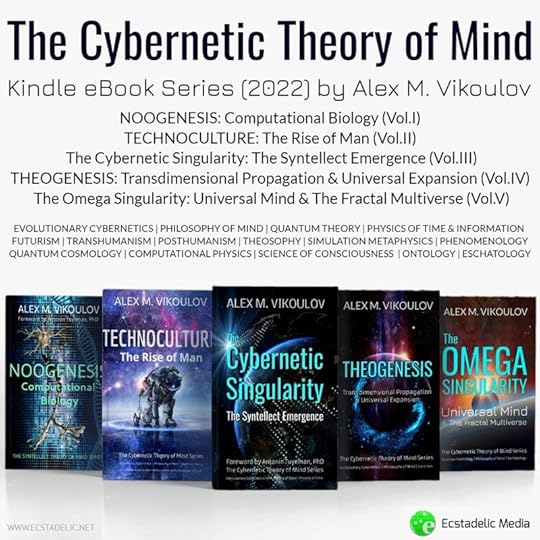
*The Syntellect Hypothesis: Five Paradigms of the Mind's Evolution by Alex M. Vikoulov (magnum opus, 2020), is available as a Kindle eBook, paperback, hardcover and Audible audiobook.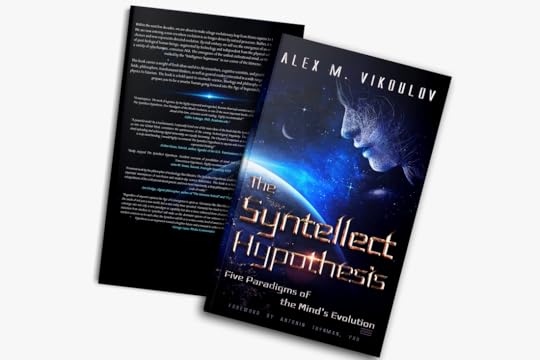
**You can watch Consciousness: Evolution of the Mind documentary in its entirety via playlist on our YouTube channel. Subscribe for exclusive content.
https://www.youtube.com/playlist?list=PLBh8LYfDZBTuJPNK7rndbzM11g4wMPkXE
Or, watch the documentary on TUBI (free w/ads):
https://tubitv.com/movies/613341/consciousness-evolution-of-the-mind
IMDb-accredited film, rated TV-PG
Director: Alex Vikoulov
Narrator: Forrest Hansen
Copyright © 2021 Ecstadelic Media Group, Burlingame, California, USA
Tags: Conscious Instant Hypothesis, stream of consciousness, quantum physics, Heisenberg's Uncertainty Principle, Marianne Williamson, techno-mysticism emerges, conscious mind, Michael Herzog, Frank Scharnowski, Two-Stage Model of Consciousness, subjective experience, Extended Mind Hypothesis, Andy Clark, David Chalmers, human brain, non-local origin, synthetic telepathy, shared consciousness, connectivity explosion, global consciousness, Syntellect Emergence, conscious experience, neural algorithm, cognitive science, Donald Hoffman, Interface Theory of Perception, phenomenology, Guilio Tononi, Integrated Information Theory, Penrose, Hameroff, Orch-OR Theory, Experiential Realism, Universal Mind, conscious observer, Conscious Realism, Global Workspace theory, Bernard Baars, neural network, Michael Graziano, Attention Schema Theory, cybernetic system, Cybernetic Theory of Mind, Noocentrism, Digital Presentism, D-Theory of Time, Experiential Realism, Ontological Holism, Multi-Ego Pantheistic Solipsism, the Omega Singularity, non-local consciousness, God's equation, Theory of Everything, phenomenal consciousness.
*Images: Shutterstock, Ecstadelic Media
 About the Author:
About the Author:
Alex Vikoulov is a Russian-American futurist, evolutionary cyberneticist and philosopher of mind, CEO/Editor-in-Chief of Ecstadelic Media Group, filmmaker, author of "The Syntellect Hypothesis: Five Paradigms of the Mind's Evolution," "The Origins of Us: Evolutionary Emergence and The Omega Point Cosmology," "The Physics of Time: D-Theory of Time & Temporal Mechanics," "The Intelligence Supernova: Essays on Cybernetic Transhumanism, The Simulation Singularity & The Syntellect Emergence," "Theology of Digital Physics: Phenomenal Consciousness, The Cosmic Self & The Pantheistic Interpretation of Our Holographic Reality," "NOOGENESIS: Computational Biology," "TECHNOCULTURE: The Rise of Man," "The Cybernetic Singularity: The Syntellect Emergence," "THEOGENESIS: Transdimensional Propagation & Universal Expansion," "The Omega Singularity: Universal Mind & The Fractal Multiverse." Self-described neo-transcendentalist, cybertheosopher, transhumanist singularitarian. Lives and works in California's Silicon Valley. More Bio...
Author Website: www.alexvikoulov.com
e-mail: alexvikoulov@ecstadelic.net

 “Old Newtonian physics claimed that things have an objective reality separate from our perception of them. Quantum physics, and particularly Heisenberg's Uncertainty Principle, reveal that, as our perception of an object changes, the object itself literally changes.” –Marianne Williamson
“Old Newtonian physics claimed that things have an objective reality separate from our perception of them. Quantum physics, and particularly Heisenberg's Uncertainty Principle, reveal that, as our perception of an object changes, the object itself literally changes.” –Marianne Williamson
Listen to this article ↴
In the intricate landscape of consciousness studies, an interdisciplinary confluence of scientific inquiry, philosophical speculation, and elements of techno-mysticism emerges. This exploration aims to challenge conventional paradigms and proffer a multifaceted examination of the nature of the conscious mind.
Among the humongous spectrum of available first-person experiences, the act of selecting a singular manifest phenomenon for awareness yields what I call a Conscious Instant (CI). A sequence of these perceptual frames constitutes what is generally known as the "stream of consciousness," which creates your continuous flow of time and your unitary sensation of reality.
Video: What is Consciousness? Consciousness: Evolution of the Mind, Part I (cc)
In a landmark 2016 paper published in PloS Biology, Michael Herzog and Frank Scharnowski introduced the Two-Stage Model of Consciousness. Their model posits that conscious perception consists of discrete "time slices," akin to individual frames in a film reel. Conscious and unconscious moments alternate in intervals up to 400 milliseconds, resulting in a quick succession of conscious instants that compose our continuum of subjective experience.
The Extended Mind Hypothesis, proposed by philosophers Andy Clark and David Chalmers, challenges the neurocentric perspective that restricts mental states to brain-based processes. Clark argues that human cognition incorporates external tools, suggesting that mental states could also be "externally" located. Clark's notion of humans as "natural-born cyborgs" underscores the extent to which external tools — ranging from rudimentary to highly sophisticated — have fundamentally influenced cognitive development throughout human history.
Technological advances have increasingly externalized cognitive processes, forecasting a future of networked cognition where physical hardware becomes increasingly inconspicuous, subsumed into a seamless computing environment. Projecting into the future, one may envision a realm of Networked Minds, where technological advancements are so integrated with cognitive faculties that the delineation between external tools and mental processes becomes increasingly nebulous. This conceptual framework suggests that human brains could function as receivers, processors, and transmitters of a global "Consciousness Cloud." Video: Consciousness & Information | Consciousness: Evolution of the Mind, Part II (cc)
Taking this a step further, some theories posit that consciousness may not be an emergent property of neural interactions, but rather a fundamental aspect of the universe itself. In this view, the human brain serves not as the generator but as the processor of consciousness, akin to a complex computational device connected to a non-local information network. Contrary to the still-dominant neuroscientific view that consciousness arises from brain activity, these emerging theories posit a "non-local" origin responsible for setting up initial cosmological conditions and quantum processes at large. This paradigmatic shift parallels the Information Age's transition to Cloud computing, where individual devices serve merely as interfaces, not originators, of information.
Concurrent with these ideas is the concept of synthetic telepathy and the subsequent emergence of a global intellect, or Syntellect. This transformative stage could signify a quantum leap in collective human cognition, further blurring the boundaries between individual and shared consciousness.
It wouldn't shock me if all the buzz around searching for the 'locus of consciousness' merely fine-tunes our grasp of how the brain is linked to consciousness — without actually revealing where consciousness comes from, because it's not generated in the brain. Similarly, your smartphone doesn't create the Internet or a cellular network; it just processes them. Networks of minds are a common occurrence throughout the natural world. What sets humans apart is the impending advent of cybernetic connectivity explosion that could soon evolve into a form of synthetic telepathy, eventually leading to the rise of a unified, global consciousness — what could be termed the Syntellect Emergence.
If we are to hypothesize about what constitutes a basic building block of conscious experience, it may not necessarily be some kind of neural algorithm, although correlated with the brain activity, but a discrete, “digital,” conscious instant, instead. This conscious instant is a subjectivistic collapse of probabilistic waves within a spectrum of potentiality. That's perhaps what integrated information “feels” like when collapsing the superposition of all other probabilities into a sequence of perceptual frames. Video: Consciousness & Time | Consciousness: Evolution of the Mind, Part III (cc)
Within the realm of cognitive science, Donald D. Hoffman's Interface Theory of Perception has garnered considerable attention. His theory posits that perception serves as a user interface, distilling complex elements of an objective reality into a simplified, species-specific constructed reality. Hoffman's theoretical framework challenges traditional neuroscientific models and offers radical new insights that could influence computational theories and phenomenology.
Guilio Tononi's Integrated Information Theory (IIT) and Penrose and Hameroff's Orch-OR Theory offer alternative viewpoints but appear to fall short in accounting for the emergence of consciousness solely from information processing. Contrary to this, my own proposed concept of 'Experiential Realism' suggests that a Universal Mind co-creates the timelines of every conscious observer, aligning more closely with Hoffman's notion of 'Conscious Realism.'
Then there's the Global Workspace theory (GWT) by Bernard J. Baars that presents the brain as a distributed society of computational agents. Here, consciousness serves as a spotlight that amplifies and disseminates information throughout the neural network. Although an apt metaphor likening consciousness to a theater, GWT leaves certain facets of this complex phenomenon inadequately explained.
Lastly, in Michael Graziano's Attention Schema Theory, the notion of consciousness is deeply entwined with the brain's mechanism for processing attention. According to Graziano, the brain constructs an "attention schema," a simplified internal model that serves to depict the computational processes behind attention. This model is purportedly not a mere account of how the brain allocates attention, but also a meta-representation that the brain uses to comprehend its own state of awareness. The theory thus integrates the complexities of attention allocation with the subjective experience of consciousness, offering a unified account of both in cognitive terms. Video: Universal Consciousness | Consciousness: Evolution of the Mind, Part IV (cc)
In summary, the study of consciousness could be conceptualized through a variety of lenses: as a series of digital perceptual snapshots, as a cybernetic system with its feedback processes, as a grand theater; or perhaps even as a VIP section in a cosmological establishment of magnificent complexity. Today’s leading theories of consciousness are largely complementary, not mutually exclusive. These multiple perspectives not only contribute to philosophical discourse but also herald the dawn of new exploratory avenues, equally enthralling and challenging, in our understanding of consciousness.
In The Cybernetic Theory of Mind (2022), I expand on existing theories to propose certain conceptual models and concepts, such as Noocentrism, Digital Presentism (D-Theory of Time), Experiential Realism, Ontological Holism, Multi-Ego Pantheistic Solipsism, the Omega Singularity, deeming a non-local consciousness, or Universal Mind, as the substrate of objective reality. In search of God's equation, we finally look upward for the source. What many religions call “God” is clearly an interdimensional being within the nested levels of complexity. Besides setting initial conditions for our universe, God speaks to us in the language of religion, spirituality, synchronicities and transcendental experiences. Video: Towards the Cybernetic Theory of Mind | Consciousness: Evolution of the Mind, Part V (cc)
By revisiting the mechanics of consciousness through the lenses of temporal discretization and extended cognition, we pave the way for a revolutionary, multidisciplinary scientific endeavor to unearth a Theory of Everything, centrally featuring phenomenal consciousness.
-Alex Vikoulov
P.S. Adapted from The Cybernetic Theory of Mind (2022), a 5-book-set where I share my deepest insights and far-reaching foresights on fascinating topics such as computational physics, evolutionary cybernetics, simulation metaphysics, physics of time, quantum cosmology, and so much more.

*The Syntellect Hypothesis: Five Paradigms of the Mind's Evolution by Alex M. Vikoulov (magnum opus, 2020), is available as a Kindle eBook, paperback, hardcover and Audible audiobook.

**You can watch Consciousness: Evolution of the Mind documentary in its entirety via playlist on our YouTube channel. Subscribe for exclusive content.
https://www.youtube.com/playlist?list=PLBh8LYfDZBTuJPNK7rndbzM11g4wMPkXE
Or, watch the documentary on TUBI (free w/ads):
https://tubitv.com/movies/613341/consciousness-evolution-of-the-mind
IMDb-accredited film, rated TV-PG
Director: Alex Vikoulov
Narrator: Forrest Hansen
Copyright © 2021 Ecstadelic Media Group, Burlingame, California, USA
Tags: Conscious Instant Hypothesis, stream of consciousness, quantum physics, Heisenberg's Uncertainty Principle, Marianne Williamson, techno-mysticism emerges, conscious mind, Michael Herzog, Frank Scharnowski, Two-Stage Model of Consciousness, subjective experience, Extended Mind Hypothesis, Andy Clark, David Chalmers, human brain, non-local origin, synthetic telepathy, shared consciousness, connectivity explosion, global consciousness, Syntellect Emergence, conscious experience, neural algorithm, cognitive science, Donald Hoffman, Interface Theory of Perception, phenomenology, Guilio Tononi, Integrated Information Theory, Penrose, Hameroff, Orch-OR Theory, Experiential Realism, Universal Mind, conscious observer, Conscious Realism, Global Workspace theory, Bernard Baars, neural network, Michael Graziano, Attention Schema Theory, cybernetic system, Cybernetic Theory of Mind, Noocentrism, Digital Presentism, D-Theory of Time, Experiential Realism, Ontological Holism, Multi-Ego Pantheistic Solipsism, the Omega Singularity, non-local consciousness, God's equation, Theory of Everything, phenomenal consciousness.
*Images: Shutterstock, Ecstadelic Media
 About the Author:
About the Author:Alex Vikoulov is a Russian-American futurist, evolutionary cyberneticist and philosopher of mind, CEO/Editor-in-Chief of Ecstadelic Media Group, filmmaker, author of "The Syntellect Hypothesis: Five Paradigms of the Mind's Evolution," "The Origins of Us: Evolutionary Emergence and The Omega Point Cosmology," "The Physics of Time: D-Theory of Time & Temporal Mechanics," "The Intelligence Supernova: Essays on Cybernetic Transhumanism, The Simulation Singularity & The Syntellect Emergence," "Theology of Digital Physics: Phenomenal Consciousness, The Cosmic Self & The Pantheistic Interpretation of Our Holographic Reality," "NOOGENESIS: Computational Biology," "TECHNOCULTURE: The Rise of Man," "The Cybernetic Singularity: The Syntellect Emergence," "THEOGENESIS: Transdimensional Propagation & Universal Expansion," "The Omega Singularity: Universal Mind & The Fractal Multiverse." Self-described neo-transcendentalist, cybertheosopher, transhumanist singularitarian. Lives and works in California's Silicon Valley. More Bio...
Author Website: www.alexvikoulov.com
e-mail: alexvikoulov@ecstadelic.net

Published on September 22, 2023 00:00
April 27, 2023
Nature's Hidden Code: The Surprising Universality of Computation
by Alex Vikoulov 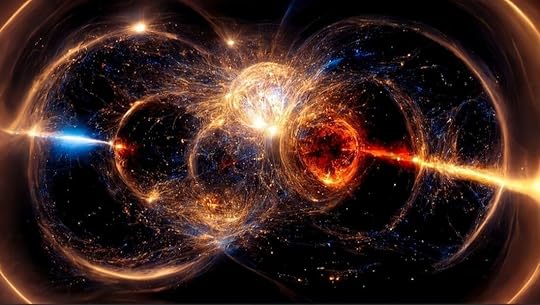 “Quantum computation is... a distinctively new way of harnessing Nature... It will be the first technology that allows useful tasks to be performed in collaboration between parallel universes.” ―David Deutsch
“Quantum computation is... a distinctively new way of harnessing Nature... It will be the first technology that allows useful tasks to be performed in collaboration between parallel universes.” ―David Deutsch
Back in 1937, Alan Turing, Alonso Church, and Emil Post laid the groundwork for useful computers. They came up with the term 'finite-state machine' to describe the most fundamental loop, which serves as the foundation for all working computers today. By analyzing this concept, Turing and Church were able to prove a theorem that now bears their names. According to their thesis, any computation performed by a finite-state machine that writes on an infinite tape (known later as a Turing machine) can be replicated by any other finite-state machine on an infinite tape, no matter how it's set up. This means that all computation is considered equivalent, and this idea is now known as 'Universal Computation.'
During the 1950s, John von Neumann and his colleagues built the first electronic computers and expanded the scope of computational laws beyond pure mathematics and into the natural world. They applied the principles of feedback loops and cybernetics to various fields such as ecology, culture, families, weather, and biological systems. They even claimed that evolution and learning are different forms of computation, and that everything in Nature can be thought of as computing.
If Nature computes, why not our entire universe? The idea that the universe could be considered a computer was first introduced by science fiction writer Isaac Asimov, who proposed this radical notion in his 1956 short story titled "The Last Question." Asimov's story features a superintelligent computer named Multivac, created by humans, which possesses recursive self-improvement abilities. This machine evolves over several generations into a single, vast computer that encompasses the whole universe.
Throughout the story, humans ask Multivac at six different stages of development if it can reverse entropy and prevent the universe from experiencing heat death. Every time, Multivac responds with: "Insufficient data for a meaningful reply." Eventually, human minds merge into the ultimate computer mind, which takes over the cosmos. The universal computer then discovers how to reverse entropy and create a new universe, announcing: "Let there be light!"
The idea that God, or at least the Universe, might be the ultimate cosmic-scale computer was not entirely dismissed as absurd, and in fact, was considered less outrageous than other notions. One of the first scientists to entertain this idea was Konrad Zuse, a relatively unknown German inventor who developed programmable digital computers ten years before John von Neumann. In 1967, Zuse proposed that the Universe operated on a grid of cellular automata (CA).
Around the same time, Edward Fredkin, a pioneer in Digital Physics, was also exploring this concept, but he made little headway until 1970 when mathematician John Conway introduced The Game of Life, a particularly resilient version of cellular automata. As the name implies, The Game of Life was a simple computational model that emulated the growth and development of living organisms.
Fredkin became intrigued with the possibility of using cellular automata (CA) to simulate physics. Despite requiring vast CAs, he found that they could scale up effectively. Consequently, he began imagining colossal CAs that would encompass everything, perhaps even the Universe itself. As Fredkin delved deeper into this metaphor, the idea that the Universe was a vast CA became increasingly compelling. By the mid-1980s, Fredkin boldly proclaimed that "the most concrete thing in the world is information," insisting that the Universe is an enormous field of cellular automata, not a mere imitation, and that everything we perceive is information.
Besides Fredkin, Stephen Wolfram was one of the early innovators to recognize the beauty of cellular automata (CAs) as a model for investigating the physical world. By manipulating CAs, Wolfram was able to generate patterns that mimicked those seen in seashells, animal skins, leaves, and sea creatures. His simple algorithmic rules could generate a wildly complicated beauty that resembled life. Wolfram was inspired by the same idea as Fredkin: the Universe behaves like a vast cellular automaton.
After years of exploring the notion of Universal Computation, Wolfram completed his 1,200-page magnum opus in 2002, which he modestly called "A New Kind of Science." In this work, he described the world as a gigantic universal computer. Wolfram reinterpreted nearly every field of science in terms of computation, arguing that simple computer programs, such as those that generate cellular automata, can model the world more effectively than traditional mathematical methods. He reminds us that all processes, whether produced by human effort or occurring spontaneously in Nature, can be viewed as computation.
Wolfram’s key contribution, though, the Principle of Computational Equivalence, is built on the old Turing-Church hypothesis: All finite-state machines are equivalent. In other words, one computer can do anything another can do. This is why your Mac can, with proper software, pretend to be a PC or, with sufficiently enhanced memory, a slow supercomputer. Wolfram extends this idea, demonstrating that the outputs of this Universal Computation are also computationally equivalent.
According to Wolfram, systems that exist in the natural world can perform computations up to a maximal level of computational power, which is universal in nature. Moreover, most systems in the natural world attain this maximal level of computational power, thereby making them computationally equivalent.
Wolfram argues that both the workings of the human brain and the evolution of weather systems, for instance, can, in principle, compute the same things as a computer. Hence, computation is simply a question of translating inputs and outputs from one system to another. This implies that the physics of a waterfall and the functioning of the human mind are equivalent, as both require the same universal process to compute the particles of water falling or a thought being formed.
As quantum theory shows, even the infinitesimal and bizarre quantum realm still obeys the universality of binary logic. Despite describing a quantum particle's existence as a continuous field of probabilities, the distinction between "is" and "isn't" becomes blurred. Yet this uncertainty resolves as soon as information makes a difference, that is as soon as it’s measured. At that moment, all other possibilities collapse to leave only the single yes/no state. Indeed, the very term ‘quantum’ suggests an indefinite realm constantly resolving into digital, or discrete, increments, precise yes/no states.
The notion that "Nature computes" and that all processes can be seen as computational, highlights the universality of computation and its vital real-world applications across fields including computer science, physics, biology, and beyond. As we've seen, universal computation refers to a system's ability to perform any computation that can be executed by a standard computer, making it an essential tool for modeling and predicting complex phenomena, including the Universe itself.
In essence, information equals reality, and the implications of this principle continue to influence and shape our understanding of the world around us. Computational universality is highly relevant to simulation metaphysics and its idea that the physical world could be a type of computer simulation.
-Alex Vikoulov
P.S. Adapted from The Cybernetic Theory of Mind (2022), a 5-book-set where I share my deepest insights and far-reaching foresights on fascinating topics such as computational physics, evolutionary cybernetics, simulation metaphysics, physics of time, quantum cosmology, and so much more.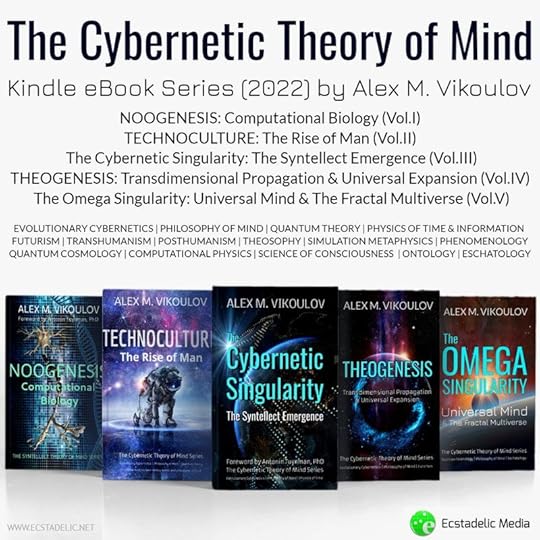
*The Syntellect Hypothesis: Five Paradigms of the Mind's Evolution by Alex M. Vikoulov (magnum opus, 2020), is available as a Kindle eBook, paperback, hardcover and Audible audiobook.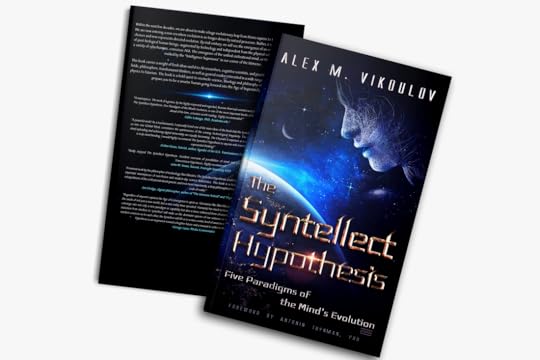
Tags: Universal Computation, computational universality, universality of computation, quantum computation, parallel universes, David Deutsch, Alan Turing, Alonso Church, Emil Post, finite-state machine, John von Neumann, cybernetics, Isaac Asimov, Konrad Zuse, Edward Fredkin, Digital Physics, John Conway, Game of Life, Stephen Wolfram, computational equivalence, universal computer, quantum theory, binary logic, simulation metaphysics, cybernetic theory of mind
*Images: Shutterstock, Ecstadelic Media
 About the Author:
About the Author:
Alex Vikoulov is a Russian-American futurist, evolutionary cyberneticist and philosopher of mind, CEO/Editor-in-Chief of Ecstadelic Media Group, filmmaker, author of "The Syntellect Hypothesis: Five Paradigms of the Mind's Evolution," "The Origins of Us: Evolutionary Emergence and The Omega Point Cosmology," "The Physics of Time: D-Theory of Time & Temporal Mechanics," "The Intelligence Supernova: Essays on Cybernetic Transhumanism, The Simulation Singularity & The Syntellect Emergence," "Theology of Digital Physics: Phenomenal Consciousness, The Cosmic Self & The Pantheistic Interpretation of Our Holographic Reality," "NOOGENESIS: Computational Biology," "TECHNOCULTURE: The Rise of Man," "The Cybernetic Singularity: The Syntellect Emergence," "THEOGENESIS: Transdimensional Propagation & Universal Expansion," "The Omega Singularity: Universal Mind & The Fractal Multiverse." Self-described neo-transcendentalist, cybertheosopher, transhumanist singularitarian. Lives and works in California's Silicon Valley. More Bio...
Author Website: www.alexvikoulov.com
e-mail: alexvikoulov@ecstadelic.net

 “Quantum computation is... a distinctively new way of harnessing Nature... It will be the first technology that allows useful tasks to be performed in collaboration between parallel universes.” ―David Deutsch
“Quantum computation is... a distinctively new way of harnessing Nature... It will be the first technology that allows useful tasks to be performed in collaboration between parallel universes.” ―David Deutsch Back in 1937, Alan Turing, Alonso Church, and Emil Post laid the groundwork for useful computers. They came up with the term 'finite-state machine' to describe the most fundamental loop, which serves as the foundation for all working computers today. By analyzing this concept, Turing and Church were able to prove a theorem that now bears their names. According to their thesis, any computation performed by a finite-state machine that writes on an infinite tape (known later as a Turing machine) can be replicated by any other finite-state machine on an infinite tape, no matter how it's set up. This means that all computation is considered equivalent, and this idea is now known as 'Universal Computation.'
During the 1950s, John von Neumann and his colleagues built the first electronic computers and expanded the scope of computational laws beyond pure mathematics and into the natural world. They applied the principles of feedback loops and cybernetics to various fields such as ecology, culture, families, weather, and biological systems. They even claimed that evolution and learning are different forms of computation, and that everything in Nature can be thought of as computing.
If Nature computes, why not our entire universe? The idea that the universe could be considered a computer was first introduced by science fiction writer Isaac Asimov, who proposed this radical notion in his 1956 short story titled "The Last Question." Asimov's story features a superintelligent computer named Multivac, created by humans, which possesses recursive self-improvement abilities. This machine evolves over several generations into a single, vast computer that encompasses the whole universe.
Throughout the story, humans ask Multivac at six different stages of development if it can reverse entropy and prevent the universe from experiencing heat death. Every time, Multivac responds with: "Insufficient data for a meaningful reply." Eventually, human minds merge into the ultimate computer mind, which takes over the cosmos. The universal computer then discovers how to reverse entropy and create a new universe, announcing: "Let there be light!"
The idea that God, or at least the Universe, might be the ultimate cosmic-scale computer was not entirely dismissed as absurd, and in fact, was considered less outrageous than other notions. One of the first scientists to entertain this idea was Konrad Zuse, a relatively unknown German inventor who developed programmable digital computers ten years before John von Neumann. In 1967, Zuse proposed that the Universe operated on a grid of cellular automata (CA).
Around the same time, Edward Fredkin, a pioneer in Digital Physics, was also exploring this concept, but he made little headway until 1970 when mathematician John Conway introduced The Game of Life, a particularly resilient version of cellular automata. As the name implies, The Game of Life was a simple computational model that emulated the growth and development of living organisms.
Fredkin became intrigued with the possibility of using cellular automata (CA) to simulate physics. Despite requiring vast CAs, he found that they could scale up effectively. Consequently, he began imagining colossal CAs that would encompass everything, perhaps even the Universe itself. As Fredkin delved deeper into this metaphor, the idea that the Universe was a vast CA became increasingly compelling. By the mid-1980s, Fredkin boldly proclaimed that "the most concrete thing in the world is information," insisting that the Universe is an enormous field of cellular automata, not a mere imitation, and that everything we perceive is information.
Besides Fredkin, Stephen Wolfram was one of the early innovators to recognize the beauty of cellular automata (CAs) as a model for investigating the physical world. By manipulating CAs, Wolfram was able to generate patterns that mimicked those seen in seashells, animal skins, leaves, and sea creatures. His simple algorithmic rules could generate a wildly complicated beauty that resembled life. Wolfram was inspired by the same idea as Fredkin: the Universe behaves like a vast cellular automaton.
After years of exploring the notion of Universal Computation, Wolfram completed his 1,200-page magnum opus in 2002, which he modestly called "A New Kind of Science." In this work, he described the world as a gigantic universal computer. Wolfram reinterpreted nearly every field of science in terms of computation, arguing that simple computer programs, such as those that generate cellular automata, can model the world more effectively than traditional mathematical methods. He reminds us that all processes, whether produced by human effort or occurring spontaneously in Nature, can be viewed as computation.
Wolfram’s key contribution, though, the Principle of Computational Equivalence, is built on the old Turing-Church hypothesis: All finite-state machines are equivalent. In other words, one computer can do anything another can do. This is why your Mac can, with proper software, pretend to be a PC or, with sufficiently enhanced memory, a slow supercomputer. Wolfram extends this idea, demonstrating that the outputs of this Universal Computation are also computationally equivalent.
According to Wolfram, systems that exist in the natural world can perform computations up to a maximal level of computational power, which is universal in nature. Moreover, most systems in the natural world attain this maximal level of computational power, thereby making them computationally equivalent.
Wolfram argues that both the workings of the human brain and the evolution of weather systems, for instance, can, in principle, compute the same things as a computer. Hence, computation is simply a question of translating inputs and outputs from one system to another. This implies that the physics of a waterfall and the functioning of the human mind are equivalent, as both require the same universal process to compute the particles of water falling or a thought being formed.
As quantum theory shows, even the infinitesimal and bizarre quantum realm still obeys the universality of binary logic. Despite describing a quantum particle's existence as a continuous field of probabilities, the distinction between "is" and "isn't" becomes blurred. Yet this uncertainty resolves as soon as information makes a difference, that is as soon as it’s measured. At that moment, all other possibilities collapse to leave only the single yes/no state. Indeed, the very term ‘quantum’ suggests an indefinite realm constantly resolving into digital, or discrete, increments, precise yes/no states.
The notion that "Nature computes" and that all processes can be seen as computational, highlights the universality of computation and its vital real-world applications across fields including computer science, physics, biology, and beyond. As we've seen, universal computation refers to a system's ability to perform any computation that can be executed by a standard computer, making it an essential tool for modeling and predicting complex phenomena, including the Universe itself.
In essence, information equals reality, and the implications of this principle continue to influence and shape our understanding of the world around us. Computational universality is highly relevant to simulation metaphysics and its idea that the physical world could be a type of computer simulation.
-Alex Vikoulov
P.S. Adapted from The Cybernetic Theory of Mind (2022), a 5-book-set where I share my deepest insights and far-reaching foresights on fascinating topics such as computational physics, evolutionary cybernetics, simulation metaphysics, physics of time, quantum cosmology, and so much more.

*The Syntellect Hypothesis: Five Paradigms of the Mind's Evolution by Alex M. Vikoulov (magnum opus, 2020), is available as a Kindle eBook, paperback, hardcover and Audible audiobook.

Tags: Universal Computation, computational universality, universality of computation, quantum computation, parallel universes, David Deutsch, Alan Turing, Alonso Church, Emil Post, finite-state machine, John von Neumann, cybernetics, Isaac Asimov, Konrad Zuse, Edward Fredkin, Digital Physics, John Conway, Game of Life, Stephen Wolfram, computational equivalence, universal computer, quantum theory, binary logic, simulation metaphysics, cybernetic theory of mind
*Images: Shutterstock, Ecstadelic Media
 About the Author:
About the Author:Alex Vikoulov is a Russian-American futurist, evolutionary cyberneticist and philosopher of mind, CEO/Editor-in-Chief of Ecstadelic Media Group, filmmaker, author of "The Syntellect Hypothesis: Five Paradigms of the Mind's Evolution," "The Origins of Us: Evolutionary Emergence and The Omega Point Cosmology," "The Physics of Time: D-Theory of Time & Temporal Mechanics," "The Intelligence Supernova: Essays on Cybernetic Transhumanism, The Simulation Singularity & The Syntellect Emergence," "Theology of Digital Physics: Phenomenal Consciousness, The Cosmic Self & The Pantheistic Interpretation of Our Holographic Reality," "NOOGENESIS: Computational Biology," "TECHNOCULTURE: The Rise of Man," "The Cybernetic Singularity: The Syntellect Emergence," "THEOGENESIS: Transdimensional Propagation & Universal Expansion," "The Omega Singularity: Universal Mind & The Fractal Multiverse." Self-described neo-transcendentalist, cybertheosopher, transhumanist singularitarian. Lives and works in California's Silicon Valley. More Bio...
Author Website: www.alexvikoulov.com
e-mail: alexvikoulov@ecstadelic.net

Published on April 27, 2023 13:49
March 29, 2023
The Quest for Ultimate Reality: Exploring Experiential Nirvana as a Path to Self-Transcendence
by Alex Vikoulov 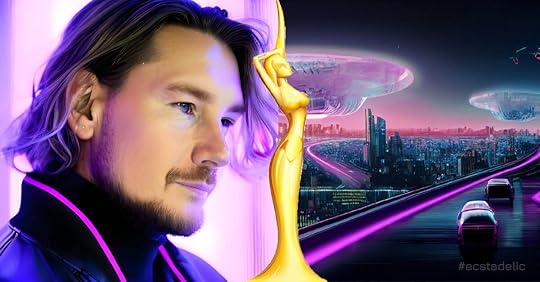 “Man suffers only because he takes seriously what the gods made for fun.” ―Alan W. Watts
“Man suffers only because he takes seriously what the gods made for fun.” ―Alan W. Watts
“What Nirvana?” you might immediately think, “there’s so much suffering in the world including ongoing problems in my own life!” According to Buddhist teachings, Nirvana is defined as a transcendent state in which there is neither suffering, desire, nor sense of self, and the subject is released from the effects of karma and the cycle of death and rebirth. Nirvana is thus associated with the highest state that someone can attain, a state of enlightenment. So, can the pursuit of experience lead to true enlightenment? Are we edging towards Experiential Nirvana on a civilizational level despite certain turbulent events?
In a matter of decades, death may become optional, and the concept of individuality may be greatly expanded through the creation of multiple copies of oneself, mind uploading and even backup copies of consciousness, leading to some kind of “distributed selfhood.” But at the same time, we are already immortal on another level, as our core self is indestructible. Dying is simply a transition to a greater existence. As Rumi once wrote, 'I died as mineral and became a plant, I died as plant and rose to animal, I died as animal and I was human. Why should I fear? When was I less by dying?' I also like to use the analogy of a river. Every river flows towards a destination, whether it be a lake, river, sea, or ocean. In the same way, our journey is one of information flow. Reincarnation is akin to flowing into another river, while self-transcendence through the Simulation Singularity and the Syntellect Emergence is similar to flowing into the ocean.
In the near future, we should anticipate certain technological developments that will forever change our world. For instance, today's text-based ChatGPT will evolve to give rise to personal "conversational AI" assistants installed in smart glasses and contact lenses that will gradually phase out smartphones. Technological advances in fields such as AI, AR/VR, bionics, and cybernetics, will eventually lead to "generative AI"-powered immersive neurotechnology that enables you to create virtual environments and holographic messages directly from your thoughts, with your imagination serving as the "prompt engineer." When everyone constantly broadcasts their mind, the Syntellect Emergence is inevitable.
The upcoming Syntellect Emergence, when our conscious minds migrate to metaverse as pattern-identities and we essentially emerge as one Global Mind, will be triggered by the Simulation Singularity. This phase transition of uploaded humanity will be marked by achieving cybernetic immortality (vs. quantum immortality and universal immortality), transcending biology, but preserving some of our organic memories in a digital format. Most significantly, this will ensure the continuity of our subjectivity into higher planes of existence. Far from being an oxymoron, Experiential Nirvana poses deep existential questions and implications.
 RELATED:
The Mental Universe Hypothesis: Reconnecting to Your Cosmic Self
RELATED:
The Mental Universe Hypothesis: Reconnecting to Your Cosmic Self
“What if when we die we wake up?” used to ask British-American philosopher Alan W. Watts (1915-1973) who is renowned for his philosophical worldview, drawing on Zen Buddhism, Hinduism, pantheism and modern science. He insisted that the whole Universe consists of a cosmic self playing hide-and-seek (Lila); hiding from itself (Maya) by becoming all the living and non-living things in the Universe and forgetting what it really is – the supreme being that we are all IT in disguise. In this worldview, Watts asserts that our conception of ourselves as an “ego in a bag of skin,” or “skin-encapsulated ego” is a myth, the entities we call the separate “things” are merely thoughts of the whole.
Reminiscent of Nozick's Experience Machine thought experiment, Watts’ typical allegory of “life as a dream” would go something like this: Imagine having the ability to dream any dream you desire. You could even manipulate your sense of time and sleep, experiencing 75 years of subjective time within just eight hours of slumber. At first, you might indulge in all your wildest fantasies, from epic love affairs and lavish banquets to exotic journeys, beautiful gardens, and otherworldly music. But after a few months of such pleasures, you would inevitably grow restless and yearn for something more adventurous.
In this new dimension, you would seek out danger and thrill in rescuing princesses from dragons, embarking on treacherous journeys, and making incredible exploits. Eventually, you might even engage in contests with enemies, always looking for a new twist to forget that it was all just a dream, and to feel anxious about it as if it were real. And of course, the best part would be waking up and realizing it was all just a dream.
The philosopher prepares you to, perhaps, the most startling realization, as he goes on: It's like a game of dares among children, daring each other to see how far they could push themselves, to explore the dimensions of being lost and powerless, to see what they could handle. And so you ask yourself the same question, knowing that you will eventually wake up. You become more and more daring, taking greater and greater risks with your dreams, until you dream the life you are living now.
It's all part of the infinite possibilities of play, pretending to not be God, because that's what makes the game fun. In this way, everyone is fundamentally the ultimate reality, not in a kingly or political sense, but as a person-God, the self that is deep down basic. You are all that, but you pretend, or perhaps willingly forget, that you are not.
If you were an eternal, superintelligent, all-powerful entity, what would you do for all of eternity? You would create and run whole-world simulations for research and entertainment, you would play ultrarealistic games via low-dimensional avatars, right?
 RELATED: Ontological Holism: The Ultimate Reality of Self-Simulating Universe, or Why We All Are One
RELATED: Ontological Holism: The Ultimate Reality of Self-Simulating Universe, or Why We All Are One
Life is continual self-transcendence. Death is an abrupt transcendence of self, an exit from a lifetime simulation, if you will. Since death becomes optional in our day and age, so instead of transcending self you may choose continual self-transcendence, evolutionary self-mastery and self-discovery. Now, here’s probably the best advice anyone could ever give to you – for instant enlightenment – all you have to do is to realize that you’re, in fact, in the midst of Experiential Nirvana, however, only if you learn to perceive it in this way! Your desire to attain Nirvana is the only thing that prevents you from actualizing it. You already have it! Accept the principle “Ordinary is extraordinary” and you’ll see your life as an exciting adventure as it is, nothing less.
The concepts of good and evil are relative, as the angelic and demonic cannot exist without each other. Every inside has an outside, and love contrasts with fear, just as light contrasts with dark and self contrasts with other. Similarly, suffering implies ecstasy and death implies life. In your own reality, ecstasy is inevitable, but so is pain. You wouldn't fully appreciate that ecstasy without having experienced pain. By the same token, without challenges and problems, your life could be dull and uninteresting. Ultimately, only two opposing forces shape our lives – love as a universal integrating force and fear as a universal disintegrating force.
Our understanding of something is dependent on what it is not, as expressed by the cosmic binary code: Yin/Yang, True/False, Infinite/Finite, Masculine/Feminine, On/Off, Yes/No, +/-, 0/1, etc. Today's geopolitical polarization is a prime example of complex but essentially binary civilizational dynamics with no single dominant superpower in the world.
Similar to how information flows in Conway's Game of Life, our actions are influenced by the motivating forces of love and fear (or their nuanced gradients like pleasure and pain) along the path of least resistance. Love and fear are the contrasting elements that make us feel alive. Love is the recognition of self-similarity in others, a fractal algorithm that follows the path of least resistance. Love is an extreme form of collaboration and the finest intelligence, acting as the glue that binds the Universe together. As we ascend to higher levels of love and become a planet of love despite our differences, we approach the end of linear human history. RELATED: The Case for Teleological Evolution
RELATED: The Case for Teleological Evolution
In this simulated [quantum computational] multiverse the essence of digital is quantum entanglement. From the Digital Physics perspective, particles of matter are pixels, or voxels if you prefer, on the screen of our perception. Your universe is in consciousness. And it’s a teleological process of unfolding patterns – teleological evolution – the case I’ve been presenting to you throughout my works. According to my philosophical worldview that I refer to as Experiential Realism, the totality of your digital reality is what your conscious mind implicitly or explicitly chooses to experience out of the infinite.
Going forward into this fantastic future of yours, now that you know its deepest secret, you can stay in the state of cosmic orgasm and challenges to overcome for trillions of years of subjective time but once in a while you would like to replay it altogether afresh with a new digital Big Bang. And you’re now in the midst of this kind of adventure, my fellow human!
-Alex Vikoulov
P.S. Adapted from The Cybernetic Theory of Mind (2022), a 5-book-set where I share my deepest insights and far-reaching foresights on fascinating topics such as cybernetic immortality, evolutionary cybernetics, quantum immortality, mind uploading, experiential nirvana, teleological evolution, experiential realism, simulation metaphysics, cyberbliss engineering, theosophy, Omega Point, physics of time, quantum cosmology, and a lot more.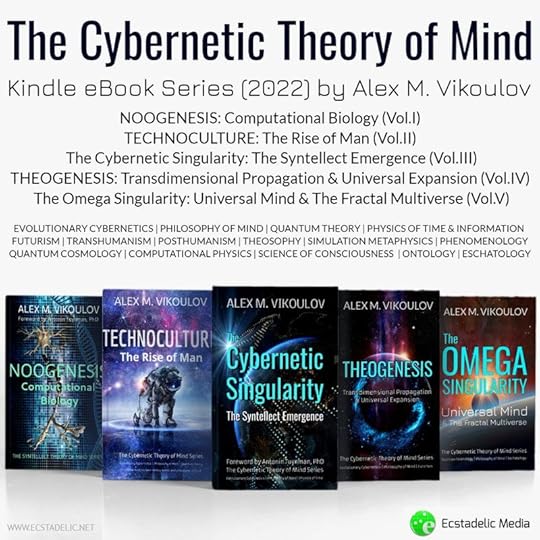
*The Syntellect Hypothesis: Five Paradigms of the Mind's Evolution by Alex M. Vikoulov (magnum opus, 2020), is available as a Kindle eBook, paperback, hardcover and Audible audiobook.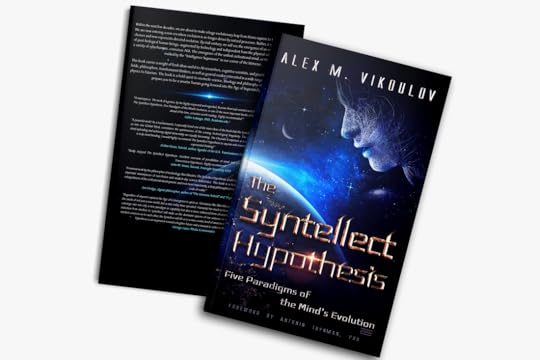
Tags: Nirvana, Experiential Nirvana, self-discovery, enlightenment, ultimate reality, Alan Watts, distributed selfhood, core self, Rumi, self-transcendence, metaverse, Simulation Singularity, ChatGPT, conversational AI, generative AI, AI assistants, AI development, AR, VR development, cybernetics, immersive technology, neurotechnology, Syntellect Emergence, Global Mind, mind uploading, cybernetic immortality, Zen Buddhism, Hinduism, pantheism, self-mastery, self-discovery, cosmic self, Nozick Experience Machine, whole world simulations, geopolitical polarization, Conway Game of Life, human history, quantum multiverse, computational multiverse, simulated multiverse, quantum entanglement, Digital Physics, teleological evolution, Experiential Realism, conscious mind, cybernetic theory of mind
*Images: Shutterstock/Liu Zishan, Ecstadelic Media/Experiential Nirvana
About the Author:
Alex Vikoulov is a Russian-American futurist, evolutionary cyberneticist and philosopher of mind, CEO/Editor-in-Chief of Ecstadelic Media Group, filmmaker, author of "The Syntellect Hypothesis: Five Paradigms of the Mind's Evolution," "The Origins of Us: Evolutionary Emergence and The Omega Point Cosmology," "The Physics of Time: D-Theory of Time & Temporal Mechanics," "The Intelligence Supernova: Essays on Cybernetic Transhumanism, The Simulation Singularity & The Syntellect Emergence," "Theology of Digital Physics: Phenomenal Consciousness, The Cosmic Self & The Pantheistic Interpretation of Our Holographic Reality," "NOOGENESIS: Computational Biology," "TECHNOCULTURE: The Rise of Man," "The Cybernetic Singularity: The Syntellect Emergence," "THEOGENESIS: Transdimensional Propagation & Universal Expansion," "The Omega Singularity: Universal Mind & The Fractal Multiverse." Self-described neo-transcendentalist, cybertheosopher, transhumanist singularitarian. Lives and works in California's Silicon Valley. More Bio...
Author Website: www.alexvikoulov.com
e-mail: alexvikoulov@ecstadelic.net

 “Man suffers only because he takes seriously what the gods made for fun.” ―Alan W. Watts
“Man suffers only because he takes seriously what the gods made for fun.” ―Alan W. Watts“What Nirvana?” you might immediately think, “there’s so much suffering in the world including ongoing problems in my own life!” According to Buddhist teachings, Nirvana is defined as a transcendent state in which there is neither suffering, desire, nor sense of self, and the subject is released from the effects of karma and the cycle of death and rebirth. Nirvana is thus associated with the highest state that someone can attain, a state of enlightenment. So, can the pursuit of experience lead to true enlightenment? Are we edging towards Experiential Nirvana on a civilizational level despite certain turbulent events?
In a matter of decades, death may become optional, and the concept of individuality may be greatly expanded through the creation of multiple copies of oneself, mind uploading and even backup copies of consciousness, leading to some kind of “distributed selfhood.” But at the same time, we are already immortal on another level, as our core self is indestructible. Dying is simply a transition to a greater existence. As Rumi once wrote, 'I died as mineral and became a plant, I died as plant and rose to animal, I died as animal and I was human. Why should I fear? When was I less by dying?' I also like to use the analogy of a river. Every river flows towards a destination, whether it be a lake, river, sea, or ocean. In the same way, our journey is one of information flow. Reincarnation is akin to flowing into another river, while self-transcendence through the Simulation Singularity and the Syntellect Emergence is similar to flowing into the ocean.
In the near future, we should anticipate certain technological developments that will forever change our world. For instance, today's text-based ChatGPT will evolve to give rise to personal "conversational AI" assistants installed in smart glasses and contact lenses that will gradually phase out smartphones. Technological advances in fields such as AI, AR/VR, bionics, and cybernetics, will eventually lead to "generative AI"-powered immersive neurotechnology that enables you to create virtual environments and holographic messages directly from your thoughts, with your imagination serving as the "prompt engineer." When everyone constantly broadcasts their mind, the Syntellect Emergence is inevitable.
The upcoming Syntellect Emergence, when our conscious minds migrate to metaverse as pattern-identities and we essentially emerge as one Global Mind, will be triggered by the Simulation Singularity. This phase transition of uploaded humanity will be marked by achieving cybernetic immortality (vs. quantum immortality and universal immortality), transcending biology, but preserving some of our organic memories in a digital format. Most significantly, this will ensure the continuity of our subjectivity into higher planes of existence. Far from being an oxymoron, Experiential Nirvana poses deep existential questions and implications.
 RELATED:
The Mental Universe Hypothesis: Reconnecting to Your Cosmic Self
RELATED:
The Mental Universe Hypothesis: Reconnecting to Your Cosmic Self
“What if when we die we wake up?” used to ask British-American philosopher Alan W. Watts (1915-1973) who is renowned for his philosophical worldview, drawing on Zen Buddhism, Hinduism, pantheism and modern science. He insisted that the whole Universe consists of a cosmic self playing hide-and-seek (Lila); hiding from itself (Maya) by becoming all the living and non-living things in the Universe and forgetting what it really is – the supreme being that we are all IT in disguise. In this worldview, Watts asserts that our conception of ourselves as an “ego in a bag of skin,” or “skin-encapsulated ego” is a myth, the entities we call the separate “things” are merely thoughts of the whole.
Reminiscent of Nozick's Experience Machine thought experiment, Watts’ typical allegory of “life as a dream” would go something like this: Imagine having the ability to dream any dream you desire. You could even manipulate your sense of time and sleep, experiencing 75 years of subjective time within just eight hours of slumber. At first, you might indulge in all your wildest fantasies, from epic love affairs and lavish banquets to exotic journeys, beautiful gardens, and otherworldly music. But after a few months of such pleasures, you would inevitably grow restless and yearn for something more adventurous.
In this new dimension, you would seek out danger and thrill in rescuing princesses from dragons, embarking on treacherous journeys, and making incredible exploits. Eventually, you might even engage in contests with enemies, always looking for a new twist to forget that it was all just a dream, and to feel anxious about it as if it were real. And of course, the best part would be waking up and realizing it was all just a dream.
The philosopher prepares you to, perhaps, the most startling realization, as he goes on: It's like a game of dares among children, daring each other to see how far they could push themselves, to explore the dimensions of being lost and powerless, to see what they could handle. And so you ask yourself the same question, knowing that you will eventually wake up. You become more and more daring, taking greater and greater risks with your dreams, until you dream the life you are living now.
It's all part of the infinite possibilities of play, pretending to not be God, because that's what makes the game fun. In this way, everyone is fundamentally the ultimate reality, not in a kingly or political sense, but as a person-God, the self that is deep down basic. You are all that, but you pretend, or perhaps willingly forget, that you are not.
If you were an eternal, superintelligent, all-powerful entity, what would you do for all of eternity? You would create and run whole-world simulations for research and entertainment, you would play ultrarealistic games via low-dimensional avatars, right?
 RELATED: Ontological Holism: The Ultimate Reality of Self-Simulating Universe, or Why We All Are One
RELATED: Ontological Holism: The Ultimate Reality of Self-Simulating Universe, or Why We All Are One Life is continual self-transcendence. Death is an abrupt transcendence of self, an exit from a lifetime simulation, if you will. Since death becomes optional in our day and age, so instead of transcending self you may choose continual self-transcendence, evolutionary self-mastery and self-discovery. Now, here’s probably the best advice anyone could ever give to you – for instant enlightenment – all you have to do is to realize that you’re, in fact, in the midst of Experiential Nirvana, however, only if you learn to perceive it in this way! Your desire to attain Nirvana is the only thing that prevents you from actualizing it. You already have it! Accept the principle “Ordinary is extraordinary” and you’ll see your life as an exciting adventure as it is, nothing less.
The concepts of good and evil are relative, as the angelic and demonic cannot exist without each other. Every inside has an outside, and love contrasts with fear, just as light contrasts with dark and self contrasts with other. Similarly, suffering implies ecstasy and death implies life. In your own reality, ecstasy is inevitable, but so is pain. You wouldn't fully appreciate that ecstasy without having experienced pain. By the same token, without challenges and problems, your life could be dull and uninteresting. Ultimately, only two opposing forces shape our lives – love as a universal integrating force and fear as a universal disintegrating force.
Our understanding of something is dependent on what it is not, as expressed by the cosmic binary code: Yin/Yang, True/False, Infinite/Finite, Masculine/Feminine, On/Off, Yes/No, +/-, 0/1, etc. Today's geopolitical polarization is a prime example of complex but essentially binary civilizational dynamics with no single dominant superpower in the world.
Similar to how information flows in Conway's Game of Life, our actions are influenced by the motivating forces of love and fear (or their nuanced gradients like pleasure and pain) along the path of least resistance. Love and fear are the contrasting elements that make us feel alive. Love is the recognition of self-similarity in others, a fractal algorithm that follows the path of least resistance. Love is an extreme form of collaboration and the finest intelligence, acting as the glue that binds the Universe together. As we ascend to higher levels of love and become a planet of love despite our differences, we approach the end of linear human history.
 RELATED: The Case for Teleological Evolution
RELATED: The Case for Teleological Evolution In this simulated [quantum computational] multiverse the essence of digital is quantum entanglement. From the Digital Physics perspective, particles of matter are pixels, or voxels if you prefer, on the screen of our perception. Your universe is in consciousness. And it’s a teleological process of unfolding patterns – teleological evolution – the case I’ve been presenting to you throughout my works. According to my philosophical worldview that I refer to as Experiential Realism, the totality of your digital reality is what your conscious mind implicitly or explicitly chooses to experience out of the infinite.
Going forward into this fantastic future of yours, now that you know its deepest secret, you can stay in the state of cosmic orgasm and challenges to overcome for trillions of years of subjective time but once in a while you would like to replay it altogether afresh with a new digital Big Bang. And you’re now in the midst of this kind of adventure, my fellow human!
-Alex Vikoulov
P.S. Adapted from The Cybernetic Theory of Mind (2022), a 5-book-set where I share my deepest insights and far-reaching foresights on fascinating topics such as cybernetic immortality, evolutionary cybernetics, quantum immortality, mind uploading, experiential nirvana, teleological evolution, experiential realism, simulation metaphysics, cyberbliss engineering, theosophy, Omega Point, physics of time, quantum cosmology, and a lot more.

*The Syntellect Hypothesis: Five Paradigms of the Mind's Evolution by Alex M. Vikoulov (magnum opus, 2020), is available as a Kindle eBook, paperback, hardcover and Audible audiobook.

Tags: Nirvana, Experiential Nirvana, self-discovery, enlightenment, ultimate reality, Alan Watts, distributed selfhood, core self, Rumi, self-transcendence, metaverse, Simulation Singularity, ChatGPT, conversational AI, generative AI, AI assistants, AI development, AR, VR development, cybernetics, immersive technology, neurotechnology, Syntellect Emergence, Global Mind, mind uploading, cybernetic immortality, Zen Buddhism, Hinduism, pantheism, self-mastery, self-discovery, cosmic self, Nozick Experience Machine, whole world simulations, geopolitical polarization, Conway Game of Life, human history, quantum multiverse, computational multiverse, simulated multiverse, quantum entanglement, Digital Physics, teleological evolution, Experiential Realism, conscious mind, cybernetic theory of mind
*Images: Shutterstock/Liu Zishan, Ecstadelic Media/Experiential Nirvana

About the Author:
Alex Vikoulov is a Russian-American futurist, evolutionary cyberneticist and philosopher of mind, CEO/Editor-in-Chief of Ecstadelic Media Group, filmmaker, author of "The Syntellect Hypothesis: Five Paradigms of the Mind's Evolution," "The Origins of Us: Evolutionary Emergence and The Omega Point Cosmology," "The Physics of Time: D-Theory of Time & Temporal Mechanics," "The Intelligence Supernova: Essays on Cybernetic Transhumanism, The Simulation Singularity & The Syntellect Emergence," "Theology of Digital Physics: Phenomenal Consciousness, The Cosmic Self & The Pantheistic Interpretation of Our Holographic Reality," "NOOGENESIS: Computational Biology," "TECHNOCULTURE: The Rise of Man," "The Cybernetic Singularity: The Syntellect Emergence," "THEOGENESIS: Transdimensional Propagation & Universal Expansion," "The Omega Singularity: Universal Mind & The Fractal Multiverse." Self-described neo-transcendentalist, cybertheosopher, transhumanist singularitarian. Lives and works in California's Silicon Valley. More Bio...
Author Website: www.alexvikoulov.com
e-mail: alexvikoulov@ecstadelic.net

Published on March 29, 2023 00:00
Experiential Nirvana: A Path to Enlightenment or One’s Ultimate Reality?
by Alex Vikoulov  “Man suffers only because he takes seriously what the gods made for fun.” ―Alan W. Watts
“Man suffers only because he takes seriously what the gods made for fun.” ―Alan W. Watts
“What Nirvana?” you might immediately think, “there’s so much suffering in the world including ongoing problems in my own life!” According to Buddhist teachings, Nirvana is defined as a transcendent state in which there is neither suffering, desire, nor sense of self, and the subject is released from the effects of karma and the cycle of death and rebirth. Nirvana is thus associated with the highest state that someone can attain, a state of enlightenment. So, can the pursuit of experience lead to true enlightenment? Are we edging towards Experiential Nirvana on a civilizational level despite certain turbulent events?
In a matter of decades, death may become optional, and the concept of individuality may be greatly expanded through the creation of multiple copies of oneself, mind uploading and even backup copies of consciousness, leading to some kind of “distributed selfhood.” But at the same time, we are already immortal on another level, as our core self is indestructible. Dying is simply a transition to a greater existence. As Rumi once wrote, 'I died as mineral and became a plant, I died as plant and rose to animal, I died as animal and I was human. Why should I fear? When was I less by dying?' I also like to use the analogy of a river. Every river flows towards a destination, whether it be a lake, river, sea, or ocean. In the same way, our journey is one of information flow. Reincarnation is akin to flowing into another river, while self-transcendence through the Simulation Singularity and the Syntellect Emergence is similar to flowing into the ocean.
The upcoming Syntellect Emergence, when we digitize our conscious minds into pattern-identities and essentially emerge as one Global Mind, will be triggered by the Simulation Singularity. This phase transition of uploaded humanity will be marked by achieving cybernetic immortality (vs. quantum immortality and universal immortality), transcending biology, but preserving some of our organic memories in a digital format. Most significantly, this will ensure the continuity of our subjectivity into higher planes of existence. Far from being an oxymoron, Experiential Nirvana poses deep existential questions and implications.
“What if when we die we wake up?” used to ask British-American philosopher Alan W. Watts (1915-1973) who is renowned for his philosophical worldview, drawing on Zen Buddhism, Hinduism, pantheism and modern science. He insisted that the whole Universe consists of a cosmic self playing hide-and-seek (Lila); hiding from itself (Maya) by becoming all the living and non-living things in the Universe and forgetting what it really is – the supreme being that we are all IT in disguise. In this worldview, Watts asserts that our conception of ourselves as an “ego in a bag of skin,” or “skin-encapsulated ego” is a myth, the entities we call the separate “things” are merely thoughts of the whole.
 RELATED:
The Mental Universe Hypothesis: Reconnecting to Your Cosmic Self
RELATED:
The Mental Universe Hypothesis: Reconnecting to Your Cosmic Self
Reminiscent of Nozick's Experience Machine thought experiment, Watts’ typical allegory of “life as a dream” would go something like this: Imagine having the ability to dream any dream you desire. You could even manipulate your sense of time and sleep, experiencing 75 years of subjective time within just eight hours of slumber. At first, you might indulge in all your wildest fantasies, from epic love affairs and lavish banquets to exotic journeys, beautiful gardens, and otherworldly music. But after a few months of such pleasures, you would inevitably grow restless and yearn for something more adventurous.
In this new dimension, you would seek out danger and thrill in rescuing princesses from dragons, embarking on treacherous journeys, and making incredible exploits. Eventually, you might even engage in contests with enemies, always looking for a new twist to forget that it was all just a dream, and to feel anxious about it as if it were real. And of course, the best part would be waking up and realizing it was all just a dream.
The philosopher prepares you to, perhaps, the most startling realization, as he goes on: It's like a game of dares among children, daring each other to see how far they could push themselves, to explore the dimensions of being lost and powerless, to see what they could handle. And so you ask yourself the same question, knowing that you will eventually wake up. You become more and more daring, taking greater and greater risks with your dreams, until you dream the life you are living now. It's all part of the infinite possibilities of play, pretending to not be God, because that's what makes the game fun. In this way, everyone is fundamentally the ultimate reality, not in a kingly or political sense, but as a person-God, the self that is deep down basic. You are all that, but you pretend, or perhaps willingly forget, that you are not.
 RELATED: Ontological Holism: The Ultimate Reality of Self-Simulating Universe, or Why We All Are One
RELATED: Ontological Holism: The Ultimate Reality of Self-Simulating Universe, or Why We All Are One
Life is continual self-transcendence. Death is an abrupt transcendence of self, an exit from a lifetime simulation, if you will. Since death becomes optional in our day and age, so instead of transcending self you may choose continual self-transcendence. Now, here’s probably the best advice anyone could ever give to you – for instant enlightenment – all you have to do is to realize that you’re, in fact, in the midst of Experiential Nirvana, however, only if you learn to perceive it in this way! Your desire to attain Nirvana is the only thing that prevents you from actualizing it. You already have it! Accept the principle “Ordinary is extraordinary” and you’ll see your life as an exciting adventure as it is, nothing less.
The concepts of good and evil are relative, as the angelic and demonic cannot exist without each other. Every inside has an outside, and love contrasts with fear, just as light contrasts with dark and self contrasts with other. Similarly, suffering implies ecstasy and death implies life. In your own reality, ecstasy is inevitable, but so is pain. You wouldn't fully appreciate that ecstasy without having experienced pain. By the same token, without challenges and problems, your life could be dull and uninteresting. Ultimately, only two opposing forces shape our lives – love as a universal integrating force and fear as a universal disintegrating force.
Our understanding of something is dependent on what it is not, as expressed by the cosmic binary code: Yin/Yang, True/False, Infinite/Finite, Masculine/Feminine, On/Off, Yes/No, +/-, 0/1, etc. Today's geopolitical polarization is a prime example of complex but essentially binary civilizational dynamics with no single dominating superpower in the world.
Similar to how information flows in Conway's Game of Life, our actions are influenced by the motivating forces of love and fear (or their nuanced gradients like pleasure and pain) along the path of least resistance. Love and fear are the contrasting elements that make us feel alive. Love is the recognition of self-similarity in others, a fractal algorithm that follows the path of least resistance. Love is an extreme form of collaboration and the finest intelligence, acting as the glue that binds the Universe together. As we ascend to higher levels of love and become a planet of love despite our differences, we approach the end of linear human history.
In this quantum [computational] multiverse the essence of digital is quantum entanglement. From the Digital Physics perspective, particles of matter are pixels, or voxels if you prefer, on the screen of our perception. Your universe is in consciousness. And it’s a teleological process of unfolding patterns – teleological evolution – the case I’ve been presenting to you throughout my works. According to my philosophical worldview that I refer to as Experiential Realism, the totality of your digital reality is what your conscious mind implicitly or explicitly chooses to experience out of the infinite.
Going forward into this fantastic future of yours, now that you know its deepest secret, you can stay in the state of cosmic orgasm and challenges to overcome for trillions of years of subjective time but once in a while you would like to replay it altogether afresh with a new digital Big Bang. And you’re now in the midst of this kind of adventure, my fellow human!
-Alex Vikoulov
P.S. Adapted from The Cybernetic Theory of Mind (2022), a 5-book-set where I share my deepest insights and far-reaching foresights on fascinating topics such as cybernetic immortality, evolutionary cybernetics, quantum immortality, mind uploading, experiential nirvana, teleological evolution, experiential realism, simulation metaphysics, cyberbliss engineering, theosophy, Omega Point, physics of time, quantum cosmology, and a lot more.
Tags: Nirvana, Experiential Nirvana, Enlightenment, Ultimate Reality, Alan Watts, distributed selfhood, core self, Rumi, self-transcendence, Simulation Singularity, Syntellect Emergence, Global Mind, mind uploading, cybernetic immortality, Zen Buddhism, Hinduism, pantheism, cosmic self, Nozick Experience Machine, geopolitical polarization, Conway Game of Life, human history, quantum multiverse, computational multiverse, quantum entanglement, Digital Physics, teleological evolution, Experiential Realism, conscious mind
*Images: Shutterstock/Liu Zishan
About the Author:
Alex Vikoulov is a Russian-American futurist, evolutionary cyberneticist and philosopher of mind, CEO/Editor-in-Chief of Ecstadelic Media Group, filmmaker, author of "The Syntellect Hypothesis: Five Paradigms of the Mind's Evolution," "The Origins of Us: Evolutionary Emergence and The Omega Point Cosmology," "The Physics of Time: D-Theory of Time & Temporal Mechanics," "The Intelligence Supernova: Essays on Cybernetic Transhumanism, The Simulation Singularity & The Syntellect Emergence," "Theology of Digital Physics: Phenomenal Consciousness, The Cosmic Self & The Pantheistic Interpretation of Our Holographic Reality," "NOOGENESIS: Computational Biology," "TECHNOCULTURE: The Rise of Man," "The Cybernetic Singularity: The Syntellect Emergence," "THEOGENESIS: Transdimensional Propagation & Universal Expansion," "The Omega Singularity: Universal Mind & The Fractal Multiverse." Self-described neo-transcendentalist, cybertheosopher, transhumanist singularitarian. Lives and works in California's Silicon Valley. More Bio...
Author Website: www.alexvikoulov.com
e-mail: alexvikoulov@ecstadelic.net

 “Man suffers only because he takes seriously what the gods made for fun.” ―Alan W. Watts
“Man suffers only because he takes seriously what the gods made for fun.” ―Alan W. Watts“What Nirvana?” you might immediately think, “there’s so much suffering in the world including ongoing problems in my own life!” According to Buddhist teachings, Nirvana is defined as a transcendent state in which there is neither suffering, desire, nor sense of self, and the subject is released from the effects of karma and the cycle of death and rebirth. Nirvana is thus associated with the highest state that someone can attain, a state of enlightenment. So, can the pursuit of experience lead to true enlightenment? Are we edging towards Experiential Nirvana on a civilizational level despite certain turbulent events?
In a matter of decades, death may become optional, and the concept of individuality may be greatly expanded through the creation of multiple copies of oneself, mind uploading and even backup copies of consciousness, leading to some kind of “distributed selfhood.” But at the same time, we are already immortal on another level, as our core self is indestructible. Dying is simply a transition to a greater existence. As Rumi once wrote, 'I died as mineral and became a plant, I died as plant and rose to animal, I died as animal and I was human. Why should I fear? When was I less by dying?' I also like to use the analogy of a river. Every river flows towards a destination, whether it be a lake, river, sea, or ocean. In the same way, our journey is one of information flow. Reincarnation is akin to flowing into another river, while self-transcendence through the Simulation Singularity and the Syntellect Emergence is similar to flowing into the ocean.
The upcoming Syntellect Emergence, when we digitize our conscious minds into pattern-identities and essentially emerge as one Global Mind, will be triggered by the Simulation Singularity. This phase transition of uploaded humanity will be marked by achieving cybernetic immortality (vs. quantum immortality and universal immortality), transcending biology, but preserving some of our organic memories in a digital format. Most significantly, this will ensure the continuity of our subjectivity into higher planes of existence. Far from being an oxymoron, Experiential Nirvana poses deep existential questions and implications.
“What if when we die we wake up?” used to ask British-American philosopher Alan W. Watts (1915-1973) who is renowned for his philosophical worldview, drawing on Zen Buddhism, Hinduism, pantheism and modern science. He insisted that the whole Universe consists of a cosmic self playing hide-and-seek (Lila); hiding from itself (Maya) by becoming all the living and non-living things in the Universe and forgetting what it really is – the supreme being that we are all IT in disguise. In this worldview, Watts asserts that our conception of ourselves as an “ego in a bag of skin,” or “skin-encapsulated ego” is a myth, the entities we call the separate “things” are merely thoughts of the whole.
 RELATED:
The Mental Universe Hypothesis: Reconnecting to Your Cosmic Self
RELATED:
The Mental Universe Hypothesis: Reconnecting to Your Cosmic Self
Reminiscent of Nozick's Experience Machine thought experiment, Watts’ typical allegory of “life as a dream” would go something like this: Imagine having the ability to dream any dream you desire. You could even manipulate your sense of time and sleep, experiencing 75 years of subjective time within just eight hours of slumber. At first, you might indulge in all your wildest fantasies, from epic love affairs and lavish banquets to exotic journeys, beautiful gardens, and otherworldly music. But after a few months of such pleasures, you would inevitably grow restless and yearn for something more adventurous.
In this new dimension, you would seek out danger and thrill in rescuing princesses from dragons, embarking on treacherous journeys, and making incredible exploits. Eventually, you might even engage in contests with enemies, always looking for a new twist to forget that it was all just a dream, and to feel anxious about it as if it were real. And of course, the best part would be waking up and realizing it was all just a dream.
The philosopher prepares you to, perhaps, the most startling realization, as he goes on: It's like a game of dares among children, daring each other to see how far they could push themselves, to explore the dimensions of being lost and powerless, to see what they could handle. And so you ask yourself the same question, knowing that you will eventually wake up. You become more and more daring, taking greater and greater risks with your dreams, until you dream the life you are living now. It's all part of the infinite possibilities of play, pretending to not be God, because that's what makes the game fun. In this way, everyone is fundamentally the ultimate reality, not in a kingly or political sense, but as a person-God, the self that is deep down basic. You are all that, but you pretend, or perhaps willingly forget, that you are not.
 RELATED: Ontological Holism: The Ultimate Reality of Self-Simulating Universe, or Why We All Are One
RELATED: Ontological Holism: The Ultimate Reality of Self-Simulating Universe, or Why We All Are One Life is continual self-transcendence. Death is an abrupt transcendence of self, an exit from a lifetime simulation, if you will. Since death becomes optional in our day and age, so instead of transcending self you may choose continual self-transcendence. Now, here’s probably the best advice anyone could ever give to you – for instant enlightenment – all you have to do is to realize that you’re, in fact, in the midst of Experiential Nirvana, however, only if you learn to perceive it in this way! Your desire to attain Nirvana is the only thing that prevents you from actualizing it. You already have it! Accept the principle “Ordinary is extraordinary” and you’ll see your life as an exciting adventure as it is, nothing less.
The concepts of good and evil are relative, as the angelic and demonic cannot exist without each other. Every inside has an outside, and love contrasts with fear, just as light contrasts with dark and self contrasts with other. Similarly, suffering implies ecstasy and death implies life. In your own reality, ecstasy is inevitable, but so is pain. You wouldn't fully appreciate that ecstasy without having experienced pain. By the same token, without challenges and problems, your life could be dull and uninteresting. Ultimately, only two opposing forces shape our lives – love as a universal integrating force and fear as a universal disintegrating force.
Our understanding of something is dependent on what it is not, as expressed by the cosmic binary code: Yin/Yang, True/False, Infinite/Finite, Masculine/Feminine, On/Off, Yes/No, +/-, 0/1, etc. Today's geopolitical polarization is a prime example of complex but essentially binary civilizational dynamics with no single dominating superpower in the world.
Similar to how information flows in Conway's Game of Life, our actions are influenced by the motivating forces of love and fear (or their nuanced gradients like pleasure and pain) along the path of least resistance. Love and fear are the contrasting elements that make us feel alive. Love is the recognition of self-similarity in others, a fractal algorithm that follows the path of least resistance. Love is an extreme form of collaboration and the finest intelligence, acting as the glue that binds the Universe together. As we ascend to higher levels of love and become a planet of love despite our differences, we approach the end of linear human history.
In this quantum [computational] multiverse the essence of digital is quantum entanglement. From the Digital Physics perspective, particles of matter are pixels, or voxels if you prefer, on the screen of our perception. Your universe is in consciousness. And it’s a teleological process of unfolding patterns – teleological evolution – the case I’ve been presenting to you throughout my works. According to my philosophical worldview that I refer to as Experiential Realism, the totality of your digital reality is what your conscious mind implicitly or explicitly chooses to experience out of the infinite.
Going forward into this fantastic future of yours, now that you know its deepest secret, you can stay in the state of cosmic orgasm and challenges to overcome for trillions of years of subjective time but once in a while you would like to replay it altogether afresh with a new digital Big Bang. And you’re now in the midst of this kind of adventure, my fellow human!
-Alex Vikoulov
P.S. Adapted from The Cybernetic Theory of Mind (2022), a 5-book-set where I share my deepest insights and far-reaching foresights on fascinating topics such as cybernetic immortality, evolutionary cybernetics, quantum immortality, mind uploading, experiential nirvana, teleological evolution, experiential realism, simulation metaphysics, cyberbliss engineering, theosophy, Omega Point, physics of time, quantum cosmology, and a lot more.

Tags: Nirvana, Experiential Nirvana, Enlightenment, Ultimate Reality, Alan Watts, distributed selfhood, core self, Rumi, self-transcendence, Simulation Singularity, Syntellect Emergence, Global Mind, mind uploading, cybernetic immortality, Zen Buddhism, Hinduism, pantheism, cosmic self, Nozick Experience Machine, geopolitical polarization, Conway Game of Life, human history, quantum multiverse, computational multiverse, quantum entanglement, Digital Physics, teleological evolution, Experiential Realism, conscious mind
*Images: Shutterstock/Liu Zishan

About the Author:
Alex Vikoulov is a Russian-American futurist, evolutionary cyberneticist and philosopher of mind, CEO/Editor-in-Chief of Ecstadelic Media Group, filmmaker, author of "The Syntellect Hypothesis: Five Paradigms of the Mind's Evolution," "The Origins of Us: Evolutionary Emergence and The Omega Point Cosmology," "The Physics of Time: D-Theory of Time & Temporal Mechanics," "The Intelligence Supernova: Essays on Cybernetic Transhumanism, The Simulation Singularity & The Syntellect Emergence," "Theology of Digital Physics: Phenomenal Consciousness, The Cosmic Self & The Pantheistic Interpretation of Our Holographic Reality," "NOOGENESIS: Computational Biology," "TECHNOCULTURE: The Rise of Man," "The Cybernetic Singularity: The Syntellect Emergence," "THEOGENESIS: Transdimensional Propagation & Universal Expansion," "The Omega Singularity: Universal Mind & The Fractal Multiverse." Self-described neo-transcendentalist, cybertheosopher, transhumanist singularitarian. Lives and works in California's Silicon Valley. More Bio...
Author Website: www.alexvikoulov.com
e-mail: alexvikoulov@ecstadelic.net

Published on March 29, 2023 00:00
February 21, 2023
The Crucial Role of an Observer: How Physics Demands a Conscious Agent
by Alex Vikoulov 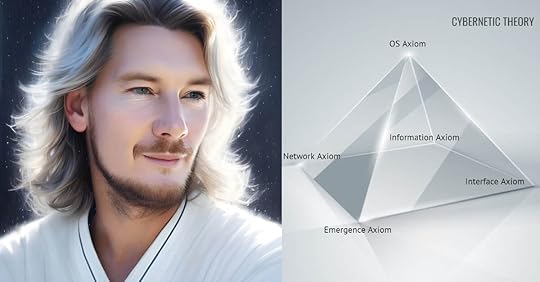 “To say that a world is objective means that the world’s existence does not depend on the agent.” ―Donald Hoffman
“To say that a world is objective means that the world’s existence does not depend on the agent.” ―Donald Hoffman
The concept of relativity pervades the field of physics, as any viewpoint ultimately boils down to a dimensionless ratio. In the realm of physical reality, a viewpoint assumes the existence of an observer and their relationship to the observed object. However, the point of quantum uncertainty exists without any such viewpoint. The fabric of space-time is made up of points that only have speed and distance relative to other points viewing them, while the points themselves remain beyond observation. As quantum physicist Vlatco Vedral explains, there is no absolute space-time, as space and time emerge from a fundamentally spaceless and timeless foundation. This challenges our classical understanding of the universe as a fixed and measurable entity and highlights the crucial role of perspective in shaping our understanding of physical reality.
In the realm of quantum mechanics, direct observation of quantum phenomena is limited. Instead, scientists rely on mathematical abstractions and complex experiments to infer the behavior of particles at the quantum level. The observable forms that do emerge are inherently nonlinear, meaning they change over time in unpredictable ways. This nonlinearity is a fundamental feature of quantum mechanics and has significant implications for our understanding of the universe. It suggests that events at the quantum level are not predetermined but rather subject to probabilistic outcomes. Additionally, it confronts our classical understanding of cause-and-effect relationships, which are based on linear, predictable interactions. Ultimately, the study of quantum mechanics requires a willingness to embrace the inherent unpredictability of the quantum world and the crucial role of the observer in creating reality itself.
The particle-wave duality is an established fact in physics, dependent on the method of measurement. Probabilities are reduced to the single actuality only when observed. In this procedural generation, pixels on the screen of “experimenting” perception – discrete particles of mass-energy leap through the quantum continuum by "trading places" with massless photons whose energy is equal to the distance leapt. A subjectivist wave function collapse serves as the interface between the quantum and the phenomenal.
To help you visualize certain concepts presented in my recent publications, I produced this documentary Consciousness: Evolution of the Mind (2021). Here's Part I: What is Consciousness?
Video: What is Consciousness? Part I of Consciousness: Evolution of the Mind (2021)- Ecstadelic Media (cc)
Entangled particles exhibit a phenomenon known as non-locality, where the measurement of a particle quality will always be correlated in its entangled counterpart, regardless of the distance between them. This suggests that the whole system determines the behavior of the individual parts, irrespective of spatial separation. Even when separated by vast distances, entangled particles behave as a single, interconnected entity with a digital-like coherence.
This non-locality (turns out not only in space but also in time) defies our classical view of causality and emphasizes the complex interdependence of the universe. It highlights the importance of examining systems as a whole rather than focusing solely on their individual components, as the behavior of one particle can have far-reaching consequences for the entire system.
The entanglement of wave packets and the superposition of their states are thought to play an essential role in the creation of the phenomenal world. When a critical mass of entanglements is achieved, or when a sufficiently large wave collapses, observable phenomena may emerge.
Video: Consciousness & Information | Part II - Ecstadelic Media (cc)
As biological organisms, we are anchored to biochemical processes that make the collapse of the wave function appear irreversible. This collapse marks a one-way arrow-of-time phenomenon that distinguishes a quantum-state from a macro-state. Once the wave function collapses, the system becomes fixed in a particular state, and it cannot revert to its prior state, resulting in a unidirectional flow of time.
The principles of time-reversible quantum mechanics and the concept of the "block universe" of space-time converge at the point of quantum to phenomenal interaction, which is a timeless event. This interaction serves as the starting point for the unidirectional "arrow of time" that characterizes the phenomenal world. At this point, the system becomes fixed in a particular state, and the irreversible collapse of the wave function sets the system on a trajectory towards the future.
Video: Consciousness & Time | Part III - Ecstadelic Media (cc)
Quantitative science and qualitative narrative are two distinct ways of epistemic knowledge. Science agrees on objective, measurable results, but usually disagrees on their interpretations. Science understands the world by devising models of reality and testing those models by making predictions. The smaller the model, the more precise its predictions might be. We can come to understand the model, but the underlying nature may still remain elusive. Our models are inherently incomplete. Laws are considered timeless, yet in a universe with a beginning, there is no explanation of where those laws were before space-time.
Models are an isolated mental subset of reality within which it is assumed the most thorough and simple laws discovered are universal. Doing science is a mental activity. Material reductionism attempts to understand conscious awareness by correlating conscious states with physical structures. The problem is that mental phenomena are not structured in a physical way but in computational and emergentistic ways.
Physical reality, such as apparent solidity of objects or experimentally observed fermions, particles of matter, as well as any other associated property such as time, is a convincing illusion. As a renowned physicist Niels Bohr once said: “Everything we call real is made of things that cannot be regarded as real.” But what’s not an illusion is your subjective experience, i.e., your consciousness, that’s the only “real” thing, the primary datum of existence. Everything else is simply explanatory abstractions. You can doubt the existence of the physical world as you perceive it, but you cannot doubt that your own mind exists.
Any theory is as good as its usefulness and predictive powers. In light of Digital Physics and Digital Philosophy of which I’m a huge proponent, as you probably know by now, quantum theory supersedes general relativity. Although both theories have been incredibly successful in making predictions in their respective domains, classical and quantum, both theories notoriously disagree with each other. The unified Quantum Gravity Theory, or the theory of everything in physics, is aimed to reconcile quantum mechanics and relativistic physics.
I recently published The Cybernetic Theory of Mind eBook series, revolving around Quantum Computational (Digital) Physics. The proposed Cybernetic Theory of Mind (CTM) starts with universal consciousness as the sole ontological point of origin, the self-simulator of observer realities, and represents a coherent theoretical framework based on quantum information processing at large. Can we be part of ancestor simulation by our future vastly superior superconsciousness?
Video: Universal Consciousness | Part IV - Ecstadelic Media (cc)
In sync with Cybernetic Theory, the Self-Simulation Hypothesis is a theory proposed by Klee Irwin of Quantum Gravity Research, which suggests that the universe is a self-simulating entity that generates and sustains its own existence through “transtemporal” feedback loops. According to the hypothesis, the universe is a self-contained computational system that simulates its own evolution, and our perceived reality is a simulation within this larger system. This implies that the physical world we experience is a digital simulation and that all matter and energy in the universe are simply bits of information being processed by this larger computational system.
These ideas have profound implications for our understanding of reality, consciousness, and the nature of existence itself. The CTM Model implies that quantum mechanical principles apply to all of reality while relativistic physics is easily reconcilable: For instance, in an observer-centric [virtual] reality, space-time is computed as if by using GPU computational resources. The faster you move closer to the speed of light, the more you’re “stretching yourself” in space, basically speeding up at the expense of time, so time would naturally slow. Conversely, if you don’t use computational resources and don’t “purchase” more speed by being still or moving slowly, time “ticks” at the “normal” rate.
Information-based interpretations of quantum mechanics such as Qbism and Cybernetic Interpretation of QM, Digital Physics, the Holographic Principle, Emergence Theory, M-Theory and the Self-Simulation Hypothesis strongly support Cybernetic Theory. The reason why simulation and computation are such powerful functional equivalents is that they provide a useful framework for resolving the paradoxes of quantum mechanics.
Video: Towards the Cybernetic Theory of Mind | Part V - Ecstadelic Media (cc)
Cybernetic Theory stems from the Syntellect Hypothesis (as in the title of my magnum opus The Syntellect Hypothesis: Five Paradigms of the Mind’s Evolution (2020)) which posits that a global network of hyperconnected sentient beings, such as humans and advanced artificial intelligence, will eventually form a single superintelligent entity, known as the Syntellect. This entity would possess vastly superior cognitive abilities, including advanced consciousness, creativity, and problem-solving skills, which would enable it to solve some of the world's most pressing problems, such as climate change and global poverty.
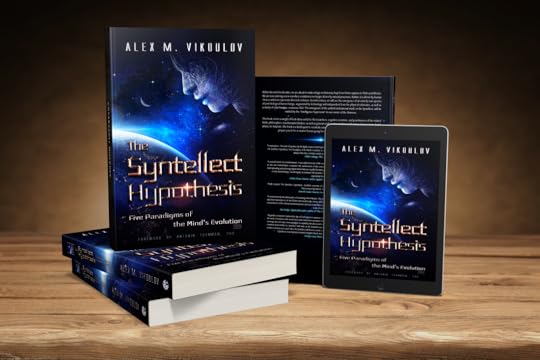 The Syntellect Hypothesis: Five Paradigms of the Mind's Evolution
(2020) by Alex M. Vikoulov
The Syntellect Hypothesis: Five Paradigms of the Mind's Evolution
(2020) by Alex M. Vikoulov
The concept of computational thinking implies that the universe itself can be seen as a quantum neural network. Many physicists currently share the view that information is fundamental, surpassing space-time, mass-energy, and everything else, all of which is below the Code. Whether it be our daily physical existence or the transcendent Universal Mind, consciousness and information are the two sides of the same ontological coin.
With the discovery of the laws of quantum physics, science and theism began to complement each other rather than oppose one another. Each of us is a microcosm of the Absolute, meaning that the Absolute is within each of us and we are like its seed. According to my Cybertheism Argument, this is an incredibly powerful, mental self-simulation where we are avatars of a greater cosmic supermind (the Omega Singularity) that recreates its own past and various reiterations thereof through ultrarealistic super-imagination.
Certainly, there's so much left unmentioned in this relatively short article -- please consider this only a quick introduction to Cybernetic Theory. I’d like to conclude this article with the quote from the renowned physicist Amit Goswami: "We are the center of the Universe because we are its meaning."
-Alex Vikoulov
* The Cybernetic Theory of Mind eBook series (2022) by Alex M. Vikoulov (5-book set) is available on Amazon:
https://www.amazon.com/dp/B08R2K7ZK2
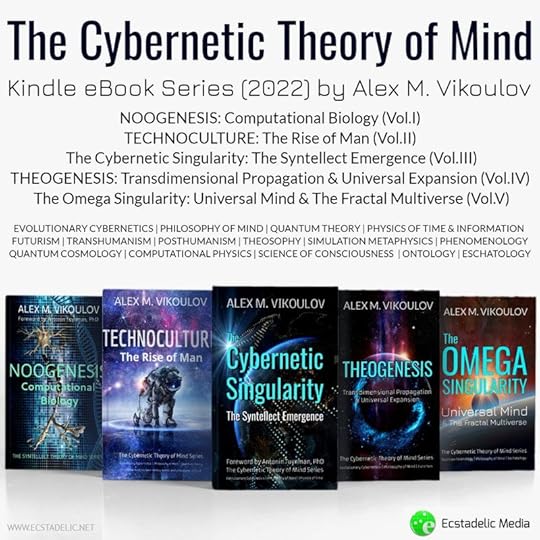
** The Syntellect Hypothesis: Five Paradigms of the Mind's Evolution (2020) by Alex M. Vikoulov is available as eBook, paperback, hardcover, and audiobook on Amazon:
https://www.amazon.com/Syntellect-Hypothesis-Paradigms-Minds-Evolution/dp/1733426140
***Join The Cybernetic Theory of the Mind public forum for news and discussions (Facebook public group of 6K+ members):
https://www.facebook.com/groups/cybernetictheoryofmind
Tags: Conscious Agent, Donald Hoffman, Vlatco Vedral, Amit Goswami, quantum mechanics, particle-wave duality, wave function collapse, non-locality, causality, superposition, flow of time, block universe, arrow of time, Niels Bohr, Klee Irwin, Digital Physics, Digital Philosophy, general relativity, Quantum Gravity Theory, theory of everything, relativistic physics, Cybernetic Theory of Mind, Quantum Computational Physics, universal consciousness, quantum information processing, ancestor simulation, superconsciousness, Cybernetic Theory, Self-Simulation Hypothesis, Quantum Gravity Research, CTM Model, Information-based interpretations of quantum mechanics, Qbism, Cybernetic Interpretation of QM, Holographic Principle, Emergence Theory, M-Theory, Syntellect Hypothesis, quantum neural network, Universal Mind, theism, Cybertheism Argument, self-simulation, cosmic supermind
*Images: Shutterstock, Ecstadelic Media
About the Author:
Alex Vikoulov is a Russian-American futurist, evolutionary cyberneticist and philosopher of mind, CEO/Editor-in-Chief of Ecstadelic Media Group, filmmaker, author of "The Syntellect Hypothesis: Five Paradigms of the Mind's Evolution," "The Origins of Us: Evolutionary Emergence and The Omega Point Cosmology," "The Physics of Time: D-Theory of Time & Temporal Mechanics," "The Intelligence Supernova: Essays on Cybernetic Transhumanism, The Simulation Singularity & The Syntellect Emergence," "Theology of Digital Physics: Phenomenal Consciousness, The Cosmic Self & The Pantheistic Interpretation of Our Holographic Reality," "NOOGENESIS: Computational Biology," "TECHNOCULTURE: The Rise of Man," "The Cybernetic Singularity: The Syntellect Emergence," "THEOGENESIS: Transdimensional Propagation & Universal Expansion," "The Omega Singularity: Universal Mind & The Fractal Multiverse." Self-described neo-transcendentalist, cybertheosopher, transhumanist singularitarian. Lives and works in California's Silicon Valley. More Bio...
Author Website: www.alexvikoulov.com
e-mail: alexvikoulov@ecstadelic.net

 “To say that a world is objective means that the world’s existence does not depend on the agent.” ―Donald Hoffman
“To say that a world is objective means that the world’s existence does not depend on the agent.” ―Donald Hoffman
The concept of relativity pervades the field of physics, as any viewpoint ultimately boils down to a dimensionless ratio. In the realm of physical reality, a viewpoint assumes the existence of an observer and their relationship to the observed object. However, the point of quantum uncertainty exists without any such viewpoint. The fabric of space-time is made up of points that only have speed and distance relative to other points viewing them, while the points themselves remain beyond observation. As quantum physicist Vlatco Vedral explains, there is no absolute space-time, as space and time emerge from a fundamentally spaceless and timeless foundation. This challenges our classical understanding of the universe as a fixed and measurable entity and highlights the crucial role of perspective in shaping our understanding of physical reality.
In the realm of quantum mechanics, direct observation of quantum phenomena is limited. Instead, scientists rely on mathematical abstractions and complex experiments to infer the behavior of particles at the quantum level. The observable forms that do emerge are inherently nonlinear, meaning they change over time in unpredictable ways. This nonlinearity is a fundamental feature of quantum mechanics and has significant implications for our understanding of the universe. It suggests that events at the quantum level are not predetermined but rather subject to probabilistic outcomes. Additionally, it confronts our classical understanding of cause-and-effect relationships, which are based on linear, predictable interactions. Ultimately, the study of quantum mechanics requires a willingness to embrace the inherent unpredictability of the quantum world and the crucial role of the observer in creating reality itself.
The particle-wave duality is an established fact in physics, dependent on the method of measurement. Probabilities are reduced to the single actuality only when observed. In this procedural generation, pixels on the screen of “experimenting” perception – discrete particles of mass-energy leap through the quantum continuum by "trading places" with massless photons whose energy is equal to the distance leapt. A subjectivist wave function collapse serves as the interface between the quantum and the phenomenal.
To help you visualize certain concepts presented in my recent publications, I produced this documentary Consciousness: Evolution of the Mind (2021). Here's Part I: What is Consciousness?
Video: What is Consciousness? Part I of Consciousness: Evolution of the Mind (2021)- Ecstadelic Media (cc)
Entangled particles exhibit a phenomenon known as non-locality, where the measurement of a particle quality will always be correlated in its entangled counterpart, regardless of the distance between them. This suggests that the whole system determines the behavior of the individual parts, irrespective of spatial separation. Even when separated by vast distances, entangled particles behave as a single, interconnected entity with a digital-like coherence.
This non-locality (turns out not only in space but also in time) defies our classical view of causality and emphasizes the complex interdependence of the universe. It highlights the importance of examining systems as a whole rather than focusing solely on their individual components, as the behavior of one particle can have far-reaching consequences for the entire system.
The entanglement of wave packets and the superposition of their states are thought to play an essential role in the creation of the phenomenal world. When a critical mass of entanglements is achieved, or when a sufficiently large wave collapses, observable phenomena may emerge.
Video: Consciousness & Information | Part II - Ecstadelic Media (cc)
As biological organisms, we are anchored to biochemical processes that make the collapse of the wave function appear irreversible. This collapse marks a one-way arrow-of-time phenomenon that distinguishes a quantum-state from a macro-state. Once the wave function collapses, the system becomes fixed in a particular state, and it cannot revert to its prior state, resulting in a unidirectional flow of time.
The principles of time-reversible quantum mechanics and the concept of the "block universe" of space-time converge at the point of quantum to phenomenal interaction, which is a timeless event. This interaction serves as the starting point for the unidirectional "arrow of time" that characterizes the phenomenal world. At this point, the system becomes fixed in a particular state, and the irreversible collapse of the wave function sets the system on a trajectory towards the future.
Video: Consciousness & Time | Part III - Ecstadelic Media (cc)
Quantitative science and qualitative narrative are two distinct ways of epistemic knowledge. Science agrees on objective, measurable results, but usually disagrees on their interpretations. Science understands the world by devising models of reality and testing those models by making predictions. The smaller the model, the more precise its predictions might be. We can come to understand the model, but the underlying nature may still remain elusive. Our models are inherently incomplete. Laws are considered timeless, yet in a universe with a beginning, there is no explanation of where those laws were before space-time.
Models are an isolated mental subset of reality within which it is assumed the most thorough and simple laws discovered are universal. Doing science is a mental activity. Material reductionism attempts to understand conscious awareness by correlating conscious states with physical structures. The problem is that mental phenomena are not structured in a physical way but in computational and emergentistic ways.
Physical reality, such as apparent solidity of objects or experimentally observed fermions, particles of matter, as well as any other associated property such as time, is a convincing illusion. As a renowned physicist Niels Bohr once said: “Everything we call real is made of things that cannot be regarded as real.” But what’s not an illusion is your subjective experience, i.e., your consciousness, that’s the only “real” thing, the primary datum of existence. Everything else is simply explanatory abstractions. You can doubt the existence of the physical world as you perceive it, but you cannot doubt that your own mind exists.
Any theory is as good as its usefulness and predictive powers. In light of Digital Physics and Digital Philosophy of which I’m a huge proponent, as you probably know by now, quantum theory supersedes general relativity. Although both theories have been incredibly successful in making predictions in their respective domains, classical and quantum, both theories notoriously disagree with each other. The unified Quantum Gravity Theory, or the theory of everything in physics, is aimed to reconcile quantum mechanics and relativistic physics.
I recently published The Cybernetic Theory of Mind eBook series, revolving around Quantum Computational (Digital) Physics. The proposed Cybernetic Theory of Mind (CTM) starts with universal consciousness as the sole ontological point of origin, the self-simulator of observer realities, and represents a coherent theoretical framework based on quantum information processing at large. Can we be part of ancestor simulation by our future vastly superior superconsciousness?
Video: Universal Consciousness | Part IV - Ecstadelic Media (cc)
In sync with Cybernetic Theory, the Self-Simulation Hypothesis is a theory proposed by Klee Irwin of Quantum Gravity Research, which suggests that the universe is a self-simulating entity that generates and sustains its own existence through “transtemporal” feedback loops. According to the hypothesis, the universe is a self-contained computational system that simulates its own evolution, and our perceived reality is a simulation within this larger system. This implies that the physical world we experience is a digital simulation and that all matter and energy in the universe are simply bits of information being processed by this larger computational system.
These ideas have profound implications for our understanding of reality, consciousness, and the nature of existence itself. The CTM Model implies that quantum mechanical principles apply to all of reality while relativistic physics is easily reconcilable: For instance, in an observer-centric [virtual] reality, space-time is computed as if by using GPU computational resources. The faster you move closer to the speed of light, the more you’re “stretching yourself” in space, basically speeding up at the expense of time, so time would naturally slow. Conversely, if you don’t use computational resources and don’t “purchase” more speed by being still or moving slowly, time “ticks” at the “normal” rate.
Information-based interpretations of quantum mechanics such as Qbism and Cybernetic Interpretation of QM, Digital Physics, the Holographic Principle, Emergence Theory, M-Theory and the Self-Simulation Hypothesis strongly support Cybernetic Theory. The reason why simulation and computation are such powerful functional equivalents is that they provide a useful framework for resolving the paradoxes of quantum mechanics.
Video: Towards the Cybernetic Theory of Mind | Part V - Ecstadelic Media (cc)
Cybernetic Theory stems from the Syntellect Hypothesis (as in the title of my magnum opus The Syntellect Hypothesis: Five Paradigms of the Mind’s Evolution (2020)) which posits that a global network of hyperconnected sentient beings, such as humans and advanced artificial intelligence, will eventually form a single superintelligent entity, known as the Syntellect. This entity would possess vastly superior cognitive abilities, including advanced consciousness, creativity, and problem-solving skills, which would enable it to solve some of the world's most pressing problems, such as climate change and global poverty.
 The Syntellect Hypothesis: Five Paradigms of the Mind's Evolution
(2020) by Alex M. Vikoulov
The Syntellect Hypothesis: Five Paradigms of the Mind's Evolution
(2020) by Alex M. Vikoulov The concept of computational thinking implies that the universe itself can be seen as a quantum neural network. Many physicists currently share the view that information is fundamental, surpassing space-time, mass-energy, and everything else, all of which is below the Code. Whether it be our daily physical existence or the transcendent Universal Mind, consciousness and information are the two sides of the same ontological coin.
With the discovery of the laws of quantum physics, science and theism began to complement each other rather than oppose one another. Each of us is a microcosm of the Absolute, meaning that the Absolute is within each of us and we are like its seed. According to my Cybertheism Argument, this is an incredibly powerful, mental self-simulation where we are avatars of a greater cosmic supermind (the Omega Singularity) that recreates its own past and various reiterations thereof through ultrarealistic super-imagination.
Certainly, there's so much left unmentioned in this relatively short article -- please consider this only a quick introduction to Cybernetic Theory. I’d like to conclude this article with the quote from the renowned physicist Amit Goswami: "We are the center of the Universe because we are its meaning."
-Alex Vikoulov
* The Cybernetic Theory of Mind eBook series (2022) by Alex M. Vikoulov (5-book set) is available on Amazon:
https://www.amazon.com/dp/B08R2K7ZK2

** The Syntellect Hypothesis: Five Paradigms of the Mind's Evolution (2020) by Alex M. Vikoulov is available as eBook, paperback, hardcover, and audiobook on Amazon:
https://www.amazon.com/Syntellect-Hypothesis-Paradigms-Minds-Evolution/dp/1733426140
***Join The Cybernetic Theory of the Mind public forum for news and discussions (Facebook public group of 6K+ members):
https://www.facebook.com/groups/cybernetictheoryofmind
Tags: Conscious Agent, Donald Hoffman, Vlatco Vedral, Amit Goswami, quantum mechanics, particle-wave duality, wave function collapse, non-locality, causality, superposition, flow of time, block universe, arrow of time, Niels Bohr, Klee Irwin, Digital Physics, Digital Philosophy, general relativity, Quantum Gravity Theory, theory of everything, relativistic physics, Cybernetic Theory of Mind, Quantum Computational Physics, universal consciousness, quantum information processing, ancestor simulation, superconsciousness, Cybernetic Theory, Self-Simulation Hypothesis, Quantum Gravity Research, CTM Model, Information-based interpretations of quantum mechanics, Qbism, Cybernetic Interpretation of QM, Holographic Principle, Emergence Theory, M-Theory, Syntellect Hypothesis, quantum neural network, Universal Mind, theism, Cybertheism Argument, self-simulation, cosmic supermind
*Images: Shutterstock, Ecstadelic Media
About the Author:
Alex Vikoulov is a Russian-American futurist, evolutionary cyberneticist and philosopher of mind, CEO/Editor-in-Chief of Ecstadelic Media Group, filmmaker, author of "The Syntellect Hypothesis: Five Paradigms of the Mind's Evolution," "The Origins of Us: Evolutionary Emergence and The Omega Point Cosmology," "The Physics of Time: D-Theory of Time & Temporal Mechanics," "The Intelligence Supernova: Essays on Cybernetic Transhumanism, The Simulation Singularity & The Syntellect Emergence," "Theology of Digital Physics: Phenomenal Consciousness, The Cosmic Self & The Pantheistic Interpretation of Our Holographic Reality," "NOOGENESIS: Computational Biology," "TECHNOCULTURE: The Rise of Man," "The Cybernetic Singularity: The Syntellect Emergence," "THEOGENESIS: Transdimensional Propagation & Universal Expansion," "The Omega Singularity: Universal Mind & The Fractal Multiverse." Self-described neo-transcendentalist, cybertheosopher, transhumanist singularitarian. Lives and works in California's Silicon Valley. More Bio...
Author Website: www.alexvikoulov.com
e-mail: alexvikoulov@ecstadelic.net

Published on February 21, 2023 00:00



